#many standards about how to deal with myths...oh. how lovely that sounds
Explore tagged Tumblr posts
Note
Hey, Amalia.
I'm sorry, I don't know if it's appropriate to ask this, you can just ignore this ask if you want to. I ask because I don't really have anyone to talk to about it and I trust you as a person who always listens and gives kind advices about relationships or anything about sex.
I feel very insecure about my vulva. First of all it's awfully ugly because I have huge inner lips. My mother thought that it's unhealthy, the gyno doctor said otherwise, but I'm still very afraid that it'll disgust my future partner. Especially after I saw what men write about it. Second is that I never had any kind of sexual intercourse but I think my hole is too big for a virgin. I know this sounds cringe and awfull, but idk how else to explain. I saw the pictures of an unbroken hymen on the internet, but it's just... too big. I have never put anything in my vagina during masturbation except one index or middle finger. But that was always okay, it didn't hurt. Why is it like that?
I'm utterly embarrassed, worried and afraid about this all at the same time😖😫😭
Hey love, so to put it in short: the way your anatomy is, is absolutely normal, fine, not disgusting, and won’t disgust a future partner if they’re a decent human being who understands that the way your vaginal lips are shaped literally doesn’t matter, it won’t even be a thought for them, they’ll appreciate you as you are and if they don’t, it’s to the curb for them and your mom is absolutely wrong, nothing about how it’s shaped is unhealthy I wanna scream for you oh my god
There’s a lot of misconception and misogynistic rhetoric about vagina and how they’re shaped, what they look like, smell like, feel like, everything, because in short you cannot have a vagina or be a person without there being certain standards as to what is “acceptable” but the truth is that your vagina, your vulva, your everything isn’t ugly at all, you’re just conditioned to see it that way
I have one inner labia that is longer than the other side, many people have puffy labias, small labias, bigger labias, labias that have lots of folds and ridges, different shaped vaginal canal entrances, etc and all of it is ok baby it’s all ok, you don’t have “too big a hole” for a virgin I promise you, that’s a myth that is also created by a misogynistic society, please don’t go comparing yourself to pictures you see because everyone’s hymen is different, it can break at different times, it can be wider, smaller, it may not be super visible or it may be, you cannot base what’s acceptable on pictures or words you hear because it’s your body, everyone’s body is gonna be different
Please please please trust yourself and your gyno baby, you have nothing to worry about but it is easy to overthink and critique every inch of yourself but I really need you to know that you don’t have to worry because nothing is wrong or abnormal or ugly about you or your vagina, it’s normal and ok just as it is and you’ll come to experience that it won’t be as big of a deal to people you sleep with or people in general as it may feel, once you start to really see oh this is how bodies actually look, all these myths get dispelled and broken down it’s just about unlearning all the bullshit we hear about how our bodies should and shouldn’t be
You’re just fine! ❤️
15 notes
·
View notes
Text
The Omegaverse Lawsuit
Everyone's been talking about the Omegaverse lawsuit recently, which is a little odd, since it was filed in September, but hey, sometimes that's how it goes!
It literally took me a little while to figure out that the names of the book series at issue here are Myth of Omega and Alpha's Claim. Like, I know this is meant to clearly signal they're Omegaverse books, but it just amused me to be talking about Omegaverse and not have it be a ficcy title. It really drove home to me how very, very different fic is as a genre from commercial original fiction, even when they're hitting the same tropes.
The first thing to note is that the complaint is not a copyright infringement claim. Instead, the plaintiff, basically a writer named Zoey Ellis, is making allegations stemming from a copyright infringement claim against *her.*
The whole thing starts with a DMCA notice. Under the Digital Millennium Copyright Act, it's really easy for copyright holders to get allegedly infringing activity taken down: they file a notice. The website hosting the allegedly infringing activity is required by the DMCA to remove the allegedly infringing activity basically immediately. The person whose material has been removed is permitted to fight against the notice, but of course many people don't do that. It takes time, effort, and a knowledge of the law. For a lot of busy, sensible people, it's often not worth it. What this means is that DMCA notices are massively abused. We know they are. Theoretically they can only be advanced in good faith, however. So, if you can prove you've got a DMCA notice that was issued in bad faith, well, that could be a thing.
Which is what this complaint builds around. It doesn't happen often, challenging a DMCA notice on bad faith grounds, but this complaint goes for it, which is impressive. And they allege a decent case because they allege a DMCA notice was issued for a book that hadn't even been published yet. Knowing an unpublished book is going to be copyright infringement before you've even seen it is a talent that you'd be smart to utilize on winning the lottery (if that’s what happened, of course).
The plaintiff here did what you're supposed to do under the DMCA if you believe your work is fine and provided counter-notices. However, unlike in the case of the original notice, counter-notices can take months to process and resolve to get the works back up.
As anyone familiar with fandom can tell you, rumors spread quickly. Once the word was out there that a DMCA notice had caused a takedown based on plagiarism, the allegations say that forums picked up on it, defaming the plaintiff's reputation.
The complaint goes on to allege a pattern of the defendant Addison Cain manipulating social media for stars and reviews. I know we theoretically have standards for how stars and reviews happen, but, really, it's a dog-eat-dog world out there in book marketing. These are the examples in the complaint:
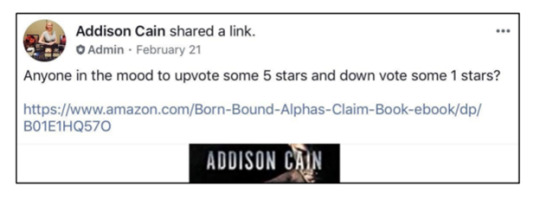
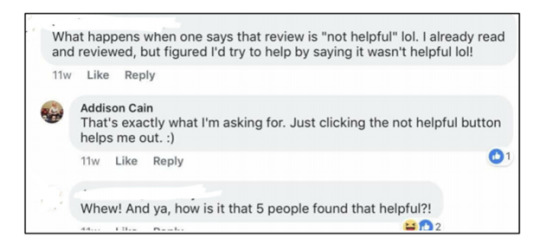
Idk, if the DMCA notice claims are true, they seem sketchy, but these communications don't strike me as that bad. The truth is, it's hard to know as an author when you're going "too far." You need to educate people as to what's helpful algorithmically, and upvoting five stars and downvoting one stars is helpful. That sounds like what she's doing, providing information so people know how they can help a writer they love. Presumably anyone doing this would seem to care enough about Addison Cain's books to spend time doing this. It doesn't seem from these excerpts like she's bribing people in any way. The second example seems especially bland to me, like, the reader seems to ask if it would be helpful to mark it "not helpful," so the reader brings it up, and then in response to Addison Cain they seem to say that they're shocked anyone would find the review helpful, which seems to me to imply that their "not helpful" designation was a true reflection of how they feel. Surely encouraging truthful and honest behavior on the part of your readers isn't a bad thing, and surely we would not ask authors to explain to readers how to be mean to them, instead of how to help them. So, I don't know, this part of the complaint strikes me as a little weak. I just don't think asking for people who liked your book to review it as scandalous as they seem to think. Like, their exhibit is titled "Review Manipulation," and it includes things like this:

(which, btw, afa I can tell, is her encouraging people to leave good review on *someone else's* book)
and

Idk, what do you think? Are you outraged by those?
Moving on:
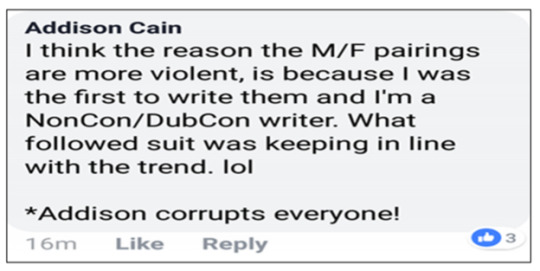
This does seem ridiculous to me. She does seem to think that she was the first to ever write a M/F Omegaverse (which the complaint alleges is provably untrue), but also seems to think that she therefore influenced the entire genre to be exactly like her. Idk. This just makes me think, like, ::raised eyebrow:: Who goes around saying "Oh, you know why that's like that? They're all copying ME!" Idk.
(Incidentally, it's interesting that she's claiming to own the straight version of the trope, that the straight version of the trope is the unusual version, because romance is in the mainstream culture dominated so much by straight love stories, and indeed every love-story example in the complaint is a het example. They use "The Runaway Bride" as an example of an enemies-to-lovers trope, which was SO WEIRD to me, I stared at it and was like, ....but all of Harry/Draco exists???? lol)
Asserting that on its own, though, would just make me roll my eyes a bit and move on. Coupled with the DMCA notice allegations, however, it does make it seem like she's trying to claim ownership over the entire M/F Omegaverse genre.
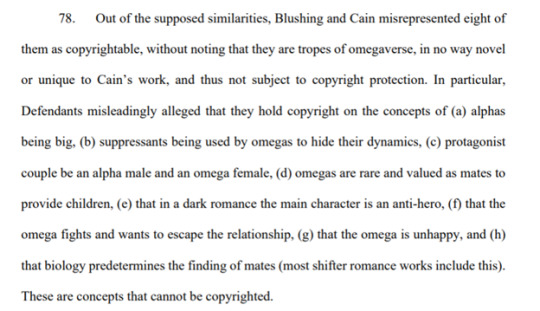
The similarities listed in the DMCA notice do seem like pretty basic aspects of the trope that I don't think anyone can own.
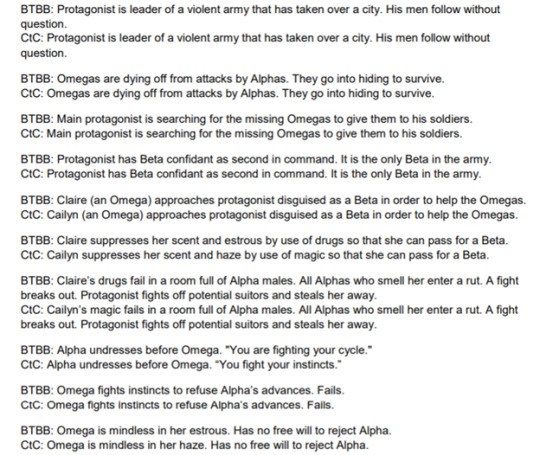
(There are more alleged. This is just the first few.)
But the DMCA notice does purport to contain reviews that say the two books are very similar.
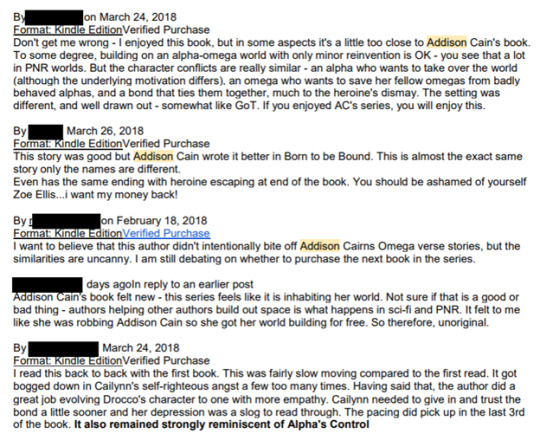
(Again, there are more, this is just a selection.) Part of me feels like maybe these people just haven't read much Omegaverse? Or haven't read fic, so they're not used to how tropes work? Idk. Without having read the books myself, it's hard for me to make this call. (And that's honestly how copyright infringement gets decided. You just have to read the books and decide if they're substantially similar in something copyrightable. Which apparently somebody did because the books were eventually reinstated as not infringing, it just didn't happen in a court of law. If this case goes on, eventually some judge is just going to have to sit down and read these.)
And of course the DMCA notice obviously chooses the most favorable to their cause, because there's also this:
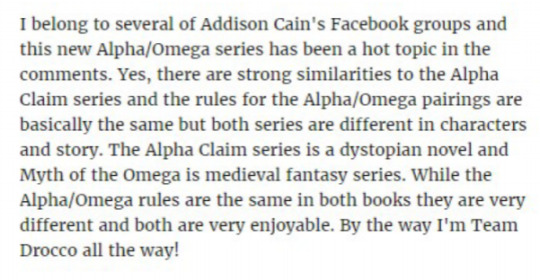
If the only similarities are the rules...that just sounds like the Omegaverse trope.
The claims itself in this case are really interesting. It's not a copyright infringement case, because the plaintiff is specifically saying they are NOT infringing. Instead, the first claim is a copyright misuse claim (that you're using the monopoly granted to you by the government in an improper way, usually understood to be anticompetitive in a way that the government didn't contemplate as being part of the copyright grant). These are relatively rare but I think it's the right call, that using your copyright to send false DMCA notices would be copyright misuse.


The defendant has now answered the complaint denying the allegations. Indeed, the defendant asserts that the complaint is defamatory because it alleges Addison Cain has only filed one other DMCA notice in ten years of being a published author and thus she has not repeatedly manipulated the system to shame other authors. It also includes a counterclaim that alleges basically that this lawsuit has been brought for harassment purposes because it’s expensive to defend a lawsuit and they alleged that online sales metrics tell them that at most Zoey Ellis has lost about $2000 worth of sales.
So that’s where the case stands now.
Other miscellaneous observations:
--The complaint has spoilers for the end of Alpha's Claim which tell me I would never read that book.
--This is what the complaint lists as the common markers of the Omegaverse trope:

--

You know, people in Omegaverse fics often grapple really hard with consent issues, and I love when that happens, and I'm sad that's obscured in this paragraph. I mean, I know the point of the complaint isn't to talk about the ways in which the trope can be subverted, but anyway.
I'm not a huge Omegaverse person, but one thing I do often enjoy about it is how stark it makes the sexism of our patriarchal society, that the gender that breeds is so devalued and treated as dangerous and cordoned off and loses agency, etc. And then how straightforwardly it often has to deal with that. And I know M/M Omegaverse often skimps on female characters but I also like how much it drives that point home, that it's not a man/woman thing, it's literally just that as soon as someone has to bear the children, that comes attached with all sorts of burdens and expectations.
And I'm also not saying that every Omegaverse author sits down to grapple with those issues, or should be, or has to be. Just that Omegaverse can reveal so much about how we structure societies. And I'm sad that this complaint is just furthering this idea that fic doesn't really do anything profound or interesting or necessary and is just:

It's cool, not all fic/writing/creativity needs to serve GREAT INTERESTS, nor should it, but also I think a lot of fic/writing/creativity does, and that gets ignored in favor of dismissing it as frivolous. Idk. Obviously this complaint is not about solving that issue, but it made me think about it.
--

OR. Hear me out. They could get together and just cuddle for 100,000 words and banter and stuff. Just sayin'. Just throwing it out there.
--

I'm honestly really annoyed by this paragraph's wording. It sounds so condescending. "Employed a degree of creativity consisted with other 'fan fictions.'" I hate those quotation marks around "fan fictions," like they're not sure those are a real thing. So-called "fan fictions" (which, who calls them fan fictions anyway? who are they quoting there lol). But also, like, what's the "degree of creativity consistent" language. Like, the standard for copyrightability is that it possesses a modicum of creativity. That's it. It's a low bar. We know the phone book doesn't have a modicum of creativity but almost everything else has SOMETHING. So this strikes me as a little...sneering and dismissive, like, "Well, it's just as creative as other 'fan fictions.'" No. It's creative. Fic is creative. This is creative. It's an entire BOOK, that no one is alleging copies anything other than tropes (AS ALL PIECES OF FICTION DO, THIS IS NOT A FIC THING). It's got plot, characters, setting, dialogue -- none of which are alleged to be copied. So, like, just say it. It's creative. It possesses a modicum of creativity. Move on. I have no idea why that weird "fan fictions" reference is in there, Idk.
--They've got an exhibit that they claim is Addison Cain online statements about the plaintiff, but I can't make heads or tails of them. They're weirdness about how she's wrote the original M/F Omegaverse, but I don't see any references to the plaintiff author Zoey Ellis, other than very vague references like this:
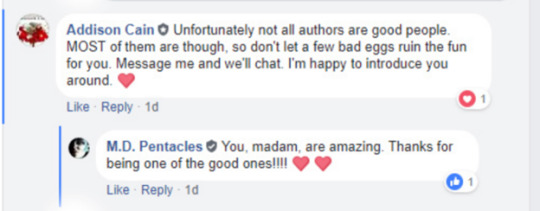
I'm a little bewildered by this exhibit. I think maybe they might be alleging that Addison Cain set up fake accounts to badmouth Zoey Ellis but if that's the case it's not clear to me, especially since they've blacked out the account name:
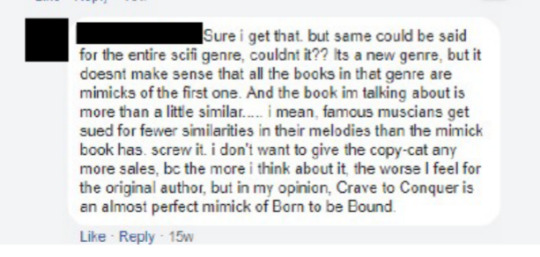
--This complaint has an exhibit that's basically an expert witness on Omegaverse. I love this so much. :-)
--Let's just enjoy this being in a legal filing:

--This isn't part of the main allegations. This is apparently, though, the kind of thing that Addison Cain has in the past considered plagiarism. Just a small selection, again, there are more. But:
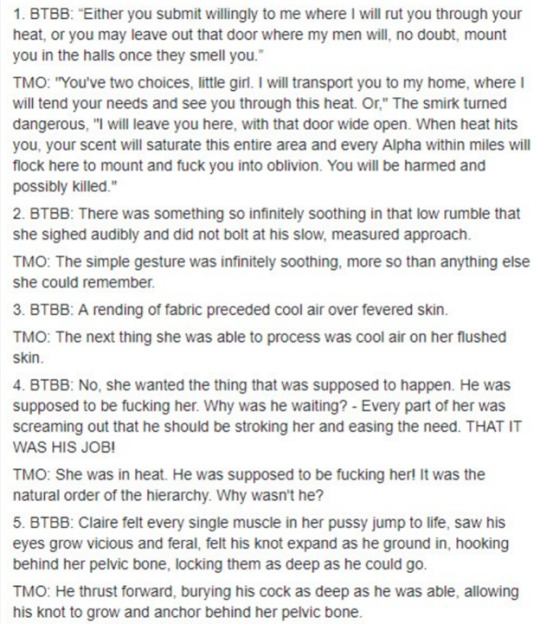
I have long said that writing a sex scene is like writing a cover letter: You’re trying to convey a very narrow series of events, over and over, and there’s only so many words you can use to do it. So comparing sex scenes like this just doesn’t make a lot of sense to me. Sex scenes will mostly inevitably sound similar in isolated sentences like this. It’s so funny, I was just saying to Aja about a gif, “He’s arching his neck to give him access like every heroine in every romance novel.” Because that’s a line we’ve all read in every romance novel.
--


Honestly, honestly, literally every single Omegaverse fic I’ve ever read has this exact moment. (And many of them do it better.)
--This complaint has taught me a lot about how much of a kink some people have for being covered in days’ worth of caked-on semen, rubbed into their bodies and massaged into their hair. Really, the complaint is kink-instructive, I recommend it.


--Honestly to me the most damning thing about this is this exhibit where Addison took matters into her own hands to post the similarities between her book and another book, because I’m just not convinced by any of these, and if this is what she thinks copyright infringement is, then I doubt she understands what it is. Bull all these BTBB/TMO comparisons have been her making her case that these two books are similar, and I’m just dubious. And then stuff like this comes up:

Omegas being tired after a heat, yup.

They…both came up with a futuristic device that has a…screen?
She does end with this:
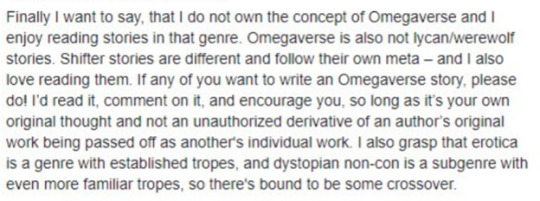
But I just don’t see what she’s claiming ownership of *other than* these really common Omegaverse tropes that I’ve read a million times. (Which isn’t to say that’s a bad thing. I’m a fic person at heart; I adore tropes.)
Anyway. That’s it. That’s the case so far. Let me know if you have questions, because lawyers can be bad at remembering what non-lawyers might be confused about.
In the meantime, I’m going to dig up some Omegaverse.
2K notes
·
View notes
Text
THURSDAY OCTOBER 8, one of the longest running television shows of our time begins airing the final episodes of it’s final season. Guys, Supernatural is 15. FIFTEEN. It can practically drive a car now. As one friend put it, “that show had a Quinceañera.” And if you don’t know how significant that is, think of the last show you know of that made it to season 10. Take your time, I’ll wait.

Whoever I stole this birthday invite from, they are probably older than this show.
I started watching Supernatural in 2008. I was 19, I had just begun my journey towards Over-Worked, Under-Slept Millennial, and my best friend recommended it. I can’t really remember how the conversation went, but I’m sure at some point it was “It’s scary, and it’s got these two brothers, I’ll send you a link!” cuz we were trash and we were broke and Netflix...existed? Hulu existed, but not in the way that either of those sites work now, so we watched by...ahem...other means. It is probably why my first laptop stopped working after 3 semesters of college.
And damn, I was hooked. I don’t do scary movies and honestly, I was legit creeped out by a lot of these episodes, but it had two hot dudes who took down a monster every week and then (the real kicker) had a bigger, season-long mystery they were trying to solve. And occasionally, they got punched in their big dumb beautiful faces. If I had known what a kink was at the time, I would have said that someone was reading my dream diary.
Over the next 12 years - Let me say that again for those of you in the back - TWELVE YEARS - I had an on-again-off-again relationship with the Winchesters. It was pretty hot and heavy in the beginning. I was jumping on the back of this 67 Chevy Impala 3 years in, so I had three seasons that I bought on DVD that I binged and was caught up with season 4 by the time the midseason started to air in late January of 2009. I was introducing all my friends to Supernatural, I made several people watch the entire first disc of season 1 with me, irregardless of whether they’d asked or not. Things started to cool down towards the end of season 4 as life started picking up and I know...I caught...the tail end of season 5? I think? I distinctly remember the final scene of the final episode, but honestly, I can’t remember how much of that season I actually watched.
At that point, I considered Supernatural to be a weird pseudoaddiction. I’d be clean for a while, years even, and then Netflix caught up with consumers and I could binge whole seasons in a weekend. It’d be, oh, I could just watch an episode. Just one episode. Maybe two. And then the weekend is gone in a blaze of classic rock and rock salt and I’m left with something like but not necessarily a hangover where my feelings live. I think I did this for seasons 6 through, like, 8? Eventually, Netflix stopped putting it at the top of my dashboard and it was easier to avoid. And I said to myself, well, when they finally get to the last season, THEN I’ll go on one last run, one last big score, and watch the whole series again in one go.
But the seasons kept coming?? And they?? Didn’t stop?? Guys, I don’t know how many of you care about this but, Friends, one of the most popular sitcoms of all time that defined an entire generation had ten seasons. TEN. Supernatural is ending with fifteen! For an industry where most shows don’t make it past a pilot, let alone a season 1, this is INSANE.
But now it’s ending. Even though a pandemic halted production just two episodes away from the finale, Supernatural is finally outta cassette tapes. The Wayward Sons may finally (??) be laying their wearied heads to rest (?? lol, I know).
And frankly, 2020’s been a real sh*tshow so I thought “Why not?”
And if I’m doing this and I’m not interacting with anyone on a human level, I might as well chronicle this epic dive into a time capsule of television because frankly, what the hell else am I doing?
Cuz that’s what this is guys. 15 years in TV time is multiple lifespans. Shows are born, grow into something Emmy-worthy, and die in less time than Supernatural has been on the air. You know what else aired their pilot episode in 2005? The American version of The Office. You know when The Office ended? 2013.
So let’s talk about pilots because that in and of itself may be a thing of the past not too far from now.
Guys, I love pilots. I will probably say this a lot over the next, uhhhh...many months, but I love pilots and I love season ones, especially for a sci-fi and fantasy shows because that’s where your characters are at their most vulnerable, their most unsure. The writers and producers are really digging around, trying to figure out what the groundwork for this world is and there’s something so exciting about exploring it with them, as an audience.
Pilot’s are great, pilots on spec are even better, and that’s a lot of what the Supernatural Pilot feels like. It’s got a real indie/guerilla-style horror movie vibe, like the crew scraped together just enough cash for that one special effect scene but had to skimp out on a lot of the other production stuff, and still managed to turn something around that is totally, 100% watchable and somehow more charming than if they’d had the budget to make something really polished? Go watch Night of the Living Dead (1968) and tell me that movie would have been better if they’d had a bigger budget. You could, but I won’t agree.
Ok so a quick break down of technical terms. A television pilot is basically the first episode of a TV show. Well, that’s not exactly true. A pilot is kind of like making a sample or a blueprint of your show that you hand over to the television networks and say, here! This is what my TV show will look like. Will you pay me money to continue making it? And the networks (think ABC, NBC, CBS, FOX and The CW - remember, this is Network, not cable) will spend January through April of every year reviewing pilots and deciding if they want to pay you money to make more episodes. Well, every year except 2020. See: sh*tshow. Sometimes the network comes to you with an idea, or maybe, you’ve pitched your script/show to some executives and they buy in for that first pilot episode to see where things will go. Neither of these scenarios are a sure thing, and pilot season is always rife with will-they-won’t-they tension. In fact, if you’re working on the show, there’s a real possibility that pilot will get re-shot after studio notes, you’ll lose your job to someone the studio liked better, and then the show still may not get picked up. A pilot shot on spec is in even more of a limbo scenario because nobody asked for this! And just to follow through on Pilot Season - after the networks decide to buy your pilot, they then air the pilot at Upfronts (usually in May) where their many ad companies decide if they will pay money to air their ads during those shows. This is where we get things like prime time and key demographics - if you thought TV was all about the art, you are very wrong. TV, like most other industries, is still a business that’s about making money.
Back to the Supernatural pilot. Now, from my research, series creator Eric Kripke had been working on the concept for 10 years. He was big into classic rock, big into urban legends and big into cowboys and all those things get married ever so neatly in this show. A lot of his initial ideas remain unchanged, at least for the first season - he wants two brothers, traveling across the country, facing off with America’s Spookiest Myths and legends. A lot of it did change. I honestly feel like I remember reading an early draft of the pilot where Sam and Dean are cowboys? But I’m also pretty sure I’m imaging that. What I’m not imagining is this ridiculous early draft where John’s been locked in an insane asylum, dies before the first episode starts, and Sam’s been living with an aunt and uncle his whole life and knows nothing. They still use something close enough to the La Llorona legend as the catalyst for the episode, but a lot of other things are changed. This is not the Sam and Dean we come to know and love. This is also a good example of when you SHOULD listen to notes, because this draft was rewritten after executive producer McG and his Wonderland Sound and Vision production company signed on, but before they actually shot the script.
Now from what I’ve read, the WB picked the show up for (4) episodes initially, and ultimately picked it up for a full season of (22) episodes. This was, at the time, a pretty standard season and a pretty standard way to get it. They had a better deal than The Office, anyway, which only got picked up for (6) episodes in their first season, then got picked up four episodes at a time for season 2.
Now let’s go over that paragraph one more time and talk about what a hecking DINOSAUR this show is -
FIRST off - Supernatural premiered on THE WB. It PREDATES The CW!!
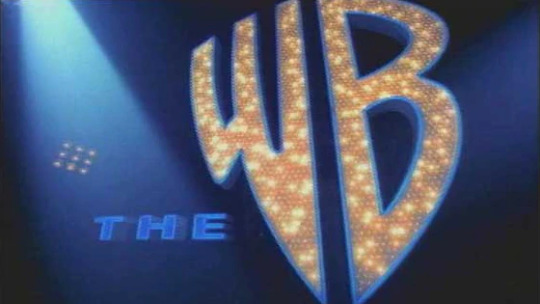
Man guys, you remember they had a frog as a mascot? Oof, that would not work today.
Secondly, it got 22 EPISODES. We’ll get into this some more when we talk about that evil bugs filler ep, but think about how many episodes were in the last show that you binged on Netflix? 8? Maybe 10?
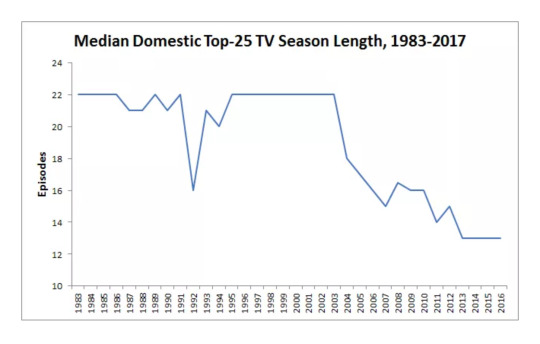
Welcome to the exciting world of GRAPHS brought to you buy https://www.theringer.com/tv/2017/8/4/16094348/inefficiency-week-mourning-the-lost-long-tv-season
OH! And SPEAKING of Netflix and streaming services like them, they’re kind of killing pilot season AND upfronts. They pick up shows when they want to. They “air” them when they feel like. There are no ads because you pay for that content on a monthly basis and also they don’t even have commercial breaks. I am slowly seeing the passage of time in one (1) episode of television and I think I’ve aged 100 years.
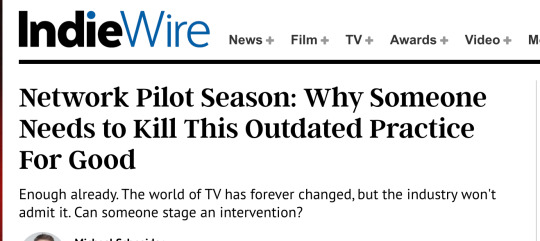
Here is just one of MANY articles about the death of Pilot Season
Finally, and most importantly, this show got a better deal than The Office. And that show was an NBC primetime show.
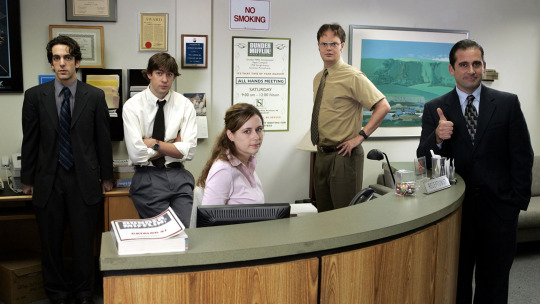
This show was nominated for 193 awards and won 50. And it ended when my nephew was still in kindergarten. He’s gonna be in high school next year.
So what about this Supernatural Pilot? Was it any good? Honestly, I’m gonna say yeah. This is some very solid Hero’s Journey here. I think the only weird thing about it is that Sam is our Hero, our point of contact character that gets us into this world. And I only say that because I’ll be real up front and say that I’m a Dean girl through and through. I don’t hate Sam, but because we live in a world where we have to choose, it’s Dean 4Eva.
From that early script draft, we learn the plan was for Sam to be in the dark and essentially be our audience stand in so that Dean can explain all the backstory. I think the decision to make John Winchester raise his kids as a weird fringe paramilitary outfit and establish Sam as the brother that tried to get away is a good one. It’s a very “Arrive Late” (or if you’re fancy, in media res,) sort of attitude and it works and you’ve already started building in the Atonement with the Father. There’s still some pretty excellent exposition dialogue, but what are ya gonna do. Sam, did you really need to explain to Dean that your collective father “raised you like warriors”? Or that you “kill everything we CAN find?” It’s fine. You’re beautiful and I love you. But also, he knows all that.
You have the Call to Adventure - Dean showing up and saying “Dad hasn’t been home in a few days.” You have the refusal of the call (“He’ll sleep it off”). You have your supernatural aid (hah!) giving Sam a push out the door - that’s Dean. You have your famous line that I quoted along with the TV - Dad’s on a hunting trip. And he hasn’t been home in a few days.
The dead mom backstory seems pretty on the nose, but the “burned on the ceiling” concept was new and unique enough that I was intrigued to find out more. Listen, I’ve already admitted I don’t watch a lot of horror so if this has been done before, don’t @ me.
La Llorona or Woman in White or Weeping Woman was a new trope to me at the time, so it too seemed fresh. I see that myth show up in a lot more Supernatural-type shows now, but in 2008, at 19, I was like, oh this is different. Not to mention - this definitely leaned in to the horror aspect. I know I’m a baby, but it aired at 9pm, which is the more adult side of Prime Time, so the WB thought it was too spooky for kids who had early bedtimes. So there.
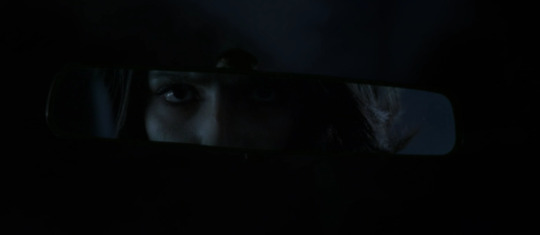
I HATE when they do this cuz it freaks me out EVERY TIME and THAT’S NOT EVEN HOW THESE MIRRORS WORK??? SHE’S NOT EVEN IN THE BACK SEAT IN THIS SHOT!
And then at the END, when Sam STILL refuses the call to adventure, you have the real Crossing of the Threshold - Jess is ALSO stuck on the ceiling, dead, and on fire. Spoiler alert, but they had to fridge her early to make the rest of the season work and so it shouldn’t be a big surprise. Sam’s all in and we get 21 more episodes of him and Dean and that car.
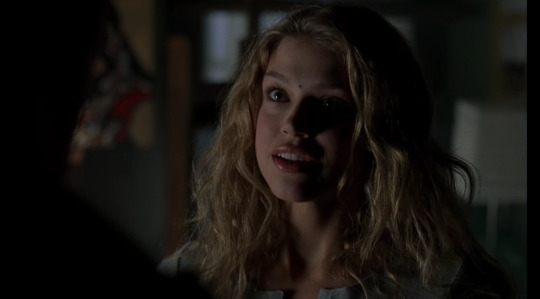
Is it technically fridging if she’s lit on fire?
And let’s talk about Jess for a second cuz actress Adrianne Palicki is giving a LOT more in this performance than a fridged girlfriend should be required to. She’s likeable, she’s down to earth, she’s crushing it and and all this with only, like, two scenes of dialogue. I say this even though we meet her in a slutty nurse costume - COME on WB.
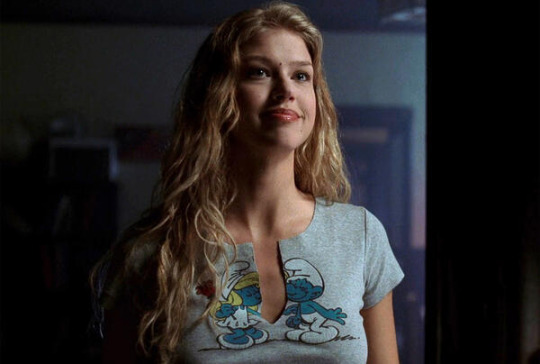
WB what the hell is this wardrobe. What the HELL is THIS.
In fact, all of the extras in this show are crushing it? Louis is instantly likeable and he disappears after his first scene, never to grace our TV’s again. And these extras in the town in Jericho, California - I kind of love them. As CW (or I guess, WB) as Jessica is, these extras look like they found them at the local highschool and I LOVE THEM FOR IT. They probably came to set already in makeup and wardrobe! They POSSIBLY brought their own jewelry! They’re weirdos and they are GREAT. I’m pretty sure this will NEVER happen again on this show because once the $$ came in, so did the more polished-looking one-off characters.
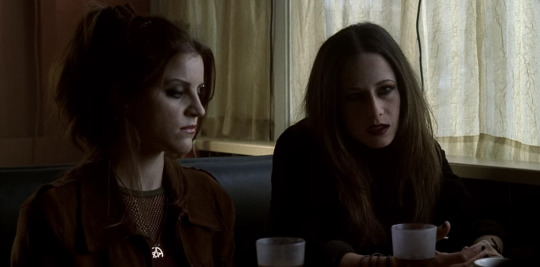
Lookit these magnificent goth weirdos! And great news, both these actresses have very full, non-goth careers after this.
Also, heckin’ Joseph Welch is just crushing it. This man has NOTHING CW about him and that’s maybe why I like him so much? Everything about the scene with him and Sam is pretty heartbreaking, from his rundown car graveyard to his rundown physique with his rundown accent to the fact that we never actually see his face. Seriously, really LOOK at this scene - WHAT is going on with this cinematography? Is this a reference to something? It’s SO bleached out and SO stark and WHAT is going on???
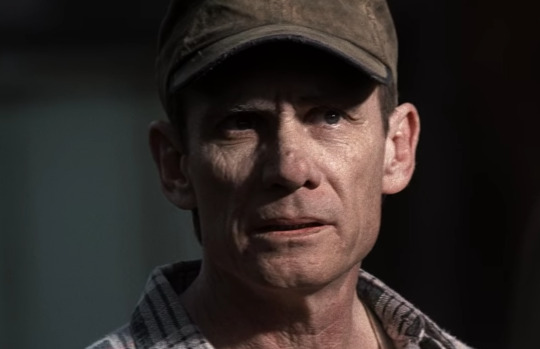
WHAT is this lighting? And also this guy was played by Steve Railsback was on X-Files!
You can’t talk about Supernatural without talking about the chemistry between Sam and Dean and that’s probably the real hook here? I mean a) very beautiful. I will probably talk about this a lot. Let’s call it what it is here, they’re beefcakes and they’re made for me and people like me. It is weird that this show is so macho but their primary audience was mostly there for the babes. And by babes I mean Jensen Ackles and Jared Padalecki. And b) they REALLY sell the whole brothers thing. They’re both from Austin, TX which feels like a weird coincidence. They were both already on WB shows before this one, also a weird coincidence. And they just click. They just do. It’s impressive, and occasionally creepy when we start to get into the Wincest of it all, but lets not talk about that.
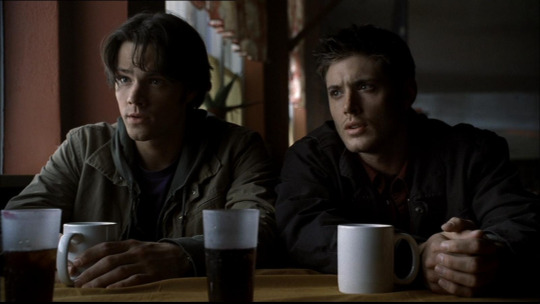
Oh, and the MUSIC! The music just makes it. If you don’t believe me, watch the Netflix version of the first season and then find yourself a DVD version. See, TV shows need to acquire a license to play popular music during the show. Nowadays, the CW actually tags their songs in the episode so you can find and presumably buy it later, but they still have to pay royalties for using those pop songs. When Netflix acquired Supernatural, they did NOT acquire the licensing to use the classic rock songs from ACDC, Metallica, etc. and so you’re left with some pretty bland and generic production music that’s something like but not necessarily Back in Black. More like, Back in...Grey? This pun didn't work how I wanted it to.
And the show just...doesn’t work? Like, who knew BACKINBLAAAAACK! Was so instrumental to whether I thought this was quality programming or not. Side note - it ruins my favorite piece of dialogue of maybe the entire series -
Sam: I swear, man, you gotta update your cassette tape collection.
Dean: Why?
Sam: Well, for one, they're cassette tapes.
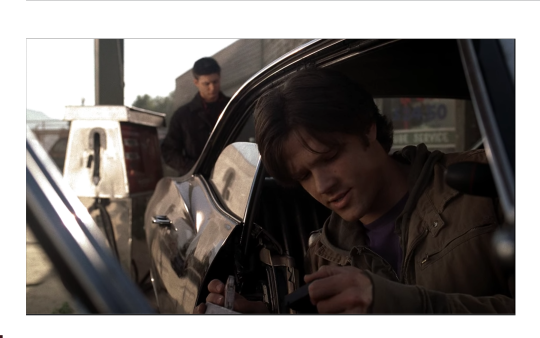
Do the young people even know what a cassette tape is? I AM the CRYPTKEEPER.
So yeah, you got a lot of ingredients to make something pretty great. Did we know then that it would launch a juggernaut of a television program that would still be on the air in the Year of Our Reckoning, 2020? I was a big fan of Firefly, so I was 99.99% sure this show was gonna get canceled at any second. In fact, I was thrilled, in 2008, to find there were two more seasons after the one I was currently watching. Of course, season 3 aired around the time of the great Writer’s Strike of ‘07, where nothing looked good and few programs survived, but we’ll get there.
In a final, kind of spooky, almost premonition-type decision the WB actually decided to air this pilot episode a whole week early on Yahoo!. Yeah, you remember Yahoo!, right? The search engine that briefly tried to have its own original streaming content and then we all abandoned it in favor of the monster that is Google? Yeah. This episode premiered online. I haven’t done enough research, but I’m gonna go out on a limb here and say this was probably one of the first ever TV shows to start on the internet? Weird to think that was a novel and innovative concept at one time.
So this is it. This is the end of the era. Are we gonna get any more shows that last as long as this one did? Who knows. Are we as a culture gonna care at that point? I don’t know. Our TV habits have changed so much in the last few years that it’s hard to say how we’ll watch TV in the future. But credit where it’s due, boys. Nice huntin’.
2 notes
·
View notes
Text
Spice & Wolf - The Solitude of Immortality
What is time for an immortal being? What does it mean for said being to fall in love with a mortal? Holo the wise wolf of Yoitsu is a pagan goddess of harvest and she has seen humans come and go for countless years. Her journey to the north with the help of the merchant Lawrence is a simply stunning tale of gentle beauty. Two people growing closer over the simple joy of travelling to new places and of course making money within a percisely crafted medieval world.
Spice & Wolf is now at it’s ten year anniversary and it is time to look at back at this quiet masterpiece (full review that is mostly free of spoilers underneath the ratings and pretty picture).
Story: 10/10 Characters: 9/10 Animation: 7/10 Enjoyment: 10/10 Overall: Season 1: 10/10 Season 2: 9/10
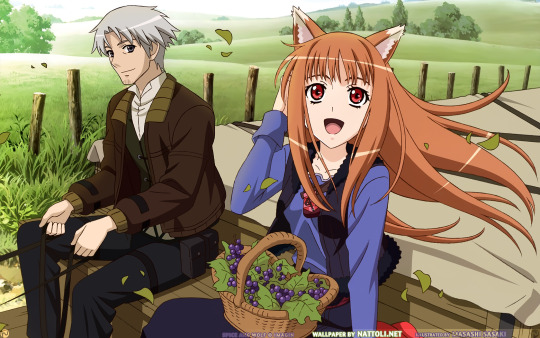
Classical Mythology often tells stories of immortal and mortal beings falling in love with one another. But it is always tragedy that strikes within these stories. Those relationships are generally plagued by misfortune and suffering (not least because the mortality of mankind is a burden for immortal beings). Wether it’s Aphrodite desperately trying to hinder Adonis from leaving her because she already knows about Ares’ plot to kill him or Zeus transforming his beloved Io into a cow to hide her from his wife Hera; the theme stays strong within the canon of old tales. Spice & Wolf, in that fashion, tries to spin its own mythos and give it a twist.
Holo the wise wolf of Yoitsu is a part of old pagan folklore within the world Spice & Wolf immerses the viewer in. Right from the get go the narration tells old myths about her blessing harvests and residing within the fields of wheat that her faithful cultivate. The paganistic villages down south are part of a change: The portrayed society is overtaken by the church. A historical evaluation of medieval Europe it seems, allthough the world itself is fictional. But is this religious powerstruggle a main focus of the show? No, it is only one of many subtle themes. The focus of Spice & Wolf rests more on the various transactions and interactions of medieval economy aswell as the relationship between Lawrence and Holo.
Speaking of this relationship: these two remarkably well written characters form a dynamic that is just exceptional. The writing of this show is -at some points- out of this world with witty banter, clever metaphors and emotional slow conversations. It is almost hypnotizing how well Spice & Wolf handles the hurdle of having mostly dialogue rather than action (Especially since there is much talk about oddly specific economy). But the dynamic shifts a lot between the two seasons since the two become somewhat of a couple. Sadly the Anime was canceled after two seasons and nearly ten years later I think it is safe to say that there is no hope for the rest of the novels to get adapted.
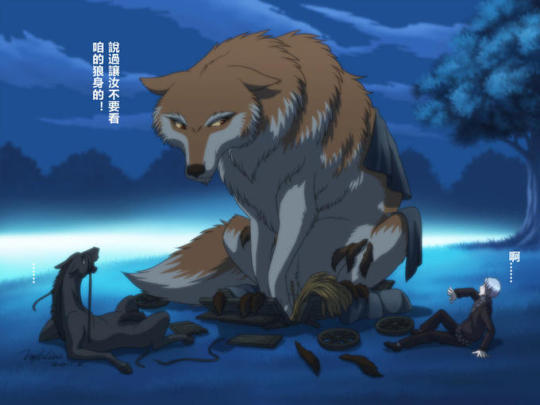
One of the driving themes this show deals with is solitude in multiple facettes as it is experienced by different persons. Lawrence as an ambitious peddler focuses on economic endeavours and often loses sight of his acquaintances and social connections on a private basis. Holo on the other hand knows a different kind of loneliness that is more derived from her being somewhat of a goddess and with that immortal as long as there is wheat blessed by her divine presence. This aspect of her character is the most pronounced within the drama aspects of the show and is dealt with quite intensely. Holo can be seen as the personification of the fleeting pagan beliefs of the world that are driven out by new religion. This theme already starts in episode 1 when the village elder tells Lawrence about how he wants to change vassalage to a new Lord who worships the new god. The village is shown to be in the process of abandoning the old rites and the festival for Holo turns more and more into just an old festival that has no longer any religious meaning for the people conducting it. Peculiar how Holo reincarnates into human form at the evening of the festival when the freshly reaped wheat is being stored. The god whos faithful stop worshipping them starts a journey back to their origin. Holo is driven back to the far north where she can find her old home where she belongs.
The clash of immortal loneliness versus selfinflicted solitude of a mortal drives the chemistry of the main characters. Holo tries to keep her distance to Lawrence since she’s seen so many men whom she loved die or be broken by the idea of her being a goddess. But Lawrence as the goodnatured man with the heart of gold does not try to win her affection. It is always a balanced back and forth between the two full of flirting, teasing and understanding each other on deeper level than pure physical attraction.
Holo and Lawrence as two beings who meet each other and learn how to end their solitude with each other, even if it is just for the moment, is a strong symbol the show uses from start to finish (even the OPs focus on this aspect) and it is excecuted in perfection.

Back in 2008-2009 the animation of Spice & Wolf must’ve turned some heads because it looks very good for the time but by modern standards it has aged visibly. The movements often seem a little janky and the backgrounds sometimes seem a little washed out and they are so unanimated that big sweeping shots look more like slideshows of people rather than a look around in a big city. Also the overall style of the designs seems outdated and quite rustic. However this is not something that distracts from the outstanding editing. The scene compositions, the direction and the framing in general and how they play of the well used soundtrack makes the show such a blast to watch. Even the english dub is actually very good, it could even be called on par with the original in some places.
The setting and its integration within the story works perfectly since the medieval world is crafted with utmost care and precision. One of many examples for this is the cathedral of Lenos which resembles the cathedral of the german town Speyer in an earlier state without the chorus being finished. To even see the attempt of creating an historically accurate depiction of a Romanic church in an Anime is such a rare sight and here it is done to perfection (The arthistorian inside me is more than just pleased with this show).

Spice & Wolf became one of my favourite shows effortlessly. It blew me away and actually moved me to tears with some of the more somber moments. The strong narrative with its many facettes grips the viewer tightly and immerses them into this wonderful world and its (rather humble) wonders. A fantasy show that has no dragons and big heroes but economics and merchants sounds boring on paper but Spice & Wolf can easily keep its head high within the genre as truly one hell of an underrated masterpiece that is far too often forgotten for louder, faster or even dumber shows. I do love it to death and I would STRONGLY recommend anyone who hasn’t at least tried to get into it to watch it. It is just that good. The only parts I would see as a little weak are the rather dated animation, the lack of development for some of the sidecharacters and the weakpoints in the somewhat forced drama narrative of the second season (which sounds worse than it actually is).
Boy oh boy this review took some time. I know I announced it quite a while ago but University had me rather busy and in total I wrote this review like 4 times. Two tries were just utter garbage and the third, finished verion got deleted by accident. I truly apologize for the delay but these things simply take a lot of time to come up with (especially since I am german and my english skills are not the best as you might’ve noticed while reading my shit).
If you have any suggestions as to which Anime I should review next, hit me up! Maybe I have seen the show you suggest or even plan to watch it in the near future. Also if there are any question regarding the review or my ideas stated in it please let me know. Also I am always open for a discussion so put some comments under this post please!
#spice and wolf#ookami to koushinryou#anime review#review#critique#holo#lawrence craft#craft lawrence#horo#fantasy anime#fantasy#animation
26 notes
·
View notes
Text
Fan Made Injustice/ MKX Style Intros 2:
Intros/Clashes Batman/ Jaune Arc Introduction 1: Batman: Why should I train you? You can barely fight. Jaune: It doesn’t matter if I can beat you. I will stand up to you. Batman: Alright. Lesson one. Introduction 2: Jaune: People find that costume scary? Batman: What do you think? Jaune: To be honest. It’s kind of dorky. Introduction 3: Batman: You’re still holding in the anger towards her. Jaune: Cinder will pay. Batman: Anger consumed Jason. I won’t let that happen again. Clash 1: Jaune: I’m doing better than I thought. Batman: You’re learning. Clash 2: Batman: Use the shield as a weapon as well. Jaune: I’m trying. Raiden/ Korra Introduction 1: Raiden: I sense great spiritual energy within you. Korra: His name is Raava if you’re curious Raiden. Raiden: Let us see if you are worthy of his trust. Introduction 2: Korra: My world has a Raiden to. Raiden: Does he serve his elder gods? Korra: No. He’s one of six beings that protect the world. Introduction 3: Raiden: You remind me of Jacqui Briggs. Korra: Yeah. I can see why. Raiden: Lets us see if you’re just as skilled. Clash 1: Raiden: You are indeed powerful. Korra: So are you. Clash 2: Korra: Wouldn’t be the first time I beat a god. Raiden: Impressive. War/ Cecada Introduction 1: War: I did not know mortals could wield a blade like my own. Cecada: And I thought the horsemen were a myth. Looks like we’re both surprised. War: We are more than just a mere myth. Introduction 2: Cecada: We have something in common, horseman. War: What could you have in common with me other than weapon choice? Cecada: I was betrayed by my master to. Introduction 3: War: This ‘Ozpin’ says you’re one of the most skilled hunters alive. Cecada: I could be. But I haven’t met all of them. War: Let us spar and see if it is true. Clash 1: War: You are indeed strong. Cecada: Right back at ya. Clash 2: Cecada: So. What do you think? War: You are quite skilled mortal. Death/ Connor Arcadia Introduction 1: Death: You wield scythes as well human? Connor Arcadia: Technically it’s a shield first then scythes. Death: Interesting. Introduction 2: Connor Arcadia: My semblance lets me see all sin and guilt you know. Death: Then you see what I have done. Connor Arcadia: But you regret it. That’s what makes you better. Introduction 3: Death: You do not fear me? Connor Arcadia: Death comes for us all. Just not today. Death: *Chuckle* I respect your courage human. Clash 1: Death: Not as nimble as me. Connor Arcadia: Sorry I can’t do three flips in the air. Clash 2: Connor Arcadia: Damn you’re almost as fast as Ruby. Death: If I ate that many sweets I would be just as fast. Fury/ Pyrrha Introduction 1: Fury: Polarity? What does that mean human? Pyrrha: I can manipulate magnetism and use it to control metal. Fury: Fascinating. Let us test this power. Introduction 2: Pyrrha: I thought it was Death, War, Pestilence, and Famine. Fury: *Chuckles* But Famine and Pestilence lead to Death, no? Pyrrha: Makes sense. But, what about Conquest? Introduction 3: Fury: I’ve always liked you humans. Pyrrha: Keep being friendly and we’ll like you to. Fury: So smart and brave. Even against unfathomable odds. Clash 1: Fury: Your skill is surprising. Pyrrha: Well. Thank you? Clash 2: Pyrrha: Never underestimate an opponent. Fury: That stops now. Ezio Aduitore/ Deathstroke Introduction 1: Ezio: So, you’re the most skilled Assassin of your time? Deathstroke: So, what if I am? Ezio: The standards for that title have fallen. Introduction 2: Deathstroke: There are legends about you. Ezio: Then you should know what you’re up against. Deathstroke: Let’s see if legend equals fact. Introduction 3: Ezio: Who brought me here and away from Roma!? Deathstroke: As if I would tell you. Ezio: Then I will beat the answer from you. Clash 1: Ezio: Seems you’re struggling. Deathstroke: I’m not done with you yet. Clash 2: Deathstroke: Seems the legends were wrong. Ezio: *Chuckles* No.They weren’t. Blake Belladonna/ Catwoman Introduction 1: Blake: You’re a thief? Catwoman: It sounds so bad when you say it like that. Blake: Why fluff up the truth? Introduction 2: Catwoman: You sure you don’t want to join me? Blake: I was a criminal once. Never again. Catwoman: Alright, have it the painful way. Introduction 3: Blake: How could you side with Superman? Catwoman: When you get tortured you can judge me. Blake: What makes you think I wasn’t? Clash 1: Blake: You’re missing. Catwoman: Damn doppelgangers. Clash 2: Catwoman: This will be the Purr-fect ending. Blake: Oh oum. Another cat pun. Hellboy/ Dante Introduction 1: Hellboy: Half demon half human? Dante: Yep. And the best demon slayer around. Hellboy: Man, what an ego. Introduction 2: Dante: You’re not like the other demons are you? Hellboy: What gave it away pal? Dante: Well the smartass mouth is one dead giveaway. Introduction 3: Hellboy: You really want to team up? Dante: Yeah! We both have good looks. What’s not to love? Hellboy: Well when you put it that way. Clash 1: Hellboy: Those weapons are crazy. Dante: Have you seen your hand? Clash 2: Dante: You’re almost as strong as Mundus. Hellboy: Who the hell is that? Superman/ Adam Taurus Introduction 1: Superman: You don’t belong here! Adam: For an alien, you sound so much like humans. Superman: I gave you a warning. Introduction 2: Adam: I’m impressed you corralled the humans so easily. Superman: Make no mistake. I’d corral your kind to. Adam: And here I thought I found an ally. Introduction 3: Superman: Finally, someone who understands how the world is. Adam: Humans are weak and scared things. Superman: Maybe I should see if you are good enough to join my team. Clash 1: Superman: I wonder how much force you can take. Adam: Much more. Clash 2: Adam: Just as weak as the humans. Superman: You’re making a mistake! Thor/ Raiden Introduction 1: Thor: Thou claims to be the god of thunder? Raiden: One of many I’m sure. Thor: Lets us test your might then! Introduction 2: Raiden: Do you protect Earth Realm to? Thor: We call it Midgard but yes I do. Raiden: Let us see if you are worthy to be its protector. Introduction 3: Thor: Do you not wish to try and pick up my hammer? Raiden: Mjolnir chose its wielder. And it chose well. Thor: Let us test our power than Raiden! Have at thee! Clash 1: Thor: Its seems our powers do not work. Raiden: Then skill decides it! Clash 2: Raiden: I will protect the mortals. Thor: Prove it to me! Gabriela Angela/ Cyborg Introduction 1: Gabriela: Interesting. My semblance can’t control you. Cyborg: My firewalls are impenetrable. Gabriela: Then I will beat you into submission. Introduction 2: Cyborg: What’s your deal anyway? Gabriela: I fight evil. That’s why I’m fighting you. Cyborg: We are not evil. Introduction 3: Gabriela: It’s a shame someone like you has fallen. Cyborg: All my friends died in Metropolis. Gabriela: That is no excuse for your evil deeds. Clash 1: Gabriela: Your fire wall is cracking. Cyborg: You’re not getting in my head. Clash 2: Cyborg: Who trained you? Gabriela: Myself! Lady/ Red Hood Introduction 1: Lady: You just kill criminals? Red Hood: Not all criminals to be fair. Lady: I wasn’t criticizing. Introduction 2:
Red Hood: Have enough guns Lady? Lady: Hm… Nope. I want yours. Red Hood: Come and try to take them. Introduction 3: Lady: You should be fighting Superman. Red Hood: Batman wouldn’t let me kill him Lady: Oh. Maybe you should make a Dark League. Clash 1: Lady: I thought you’d be better. Red Hood: Shut up and get beat down. Clash 2: Red Hood: Maybe we should get pizza after. Lady: Did you just ask me on a date?! Nora Valkyrie/ Harley Quinn Introduction 1: Nora: We should break Superman’s legs! Harley Quinn: How about slaps and tickles at ten paces? Nora; Oh! Breaking his face is even better! Introduction 2: Harley Quinn: You and Ren are so cute together. Nora: We’re not together, together. Harley Quinn: Boring! You totally should be! Introduction 3: Nora: Stop! Harley Quinn: Hammer time! Nora: *Laughs* So funny! Clash 1: Nora: Where’s your big red nose? Harley Quinn: Not that kind of clown. Clash 2: Harley Quinn: I like your hammer better. Nora: Get your own.
#injustice#mortal kombat#intros#clashes#dc comics#oc#rwby#legend of korra#devil may cry#hellboy#marvel#Assassin's Creed#darksiders
97 notes
·
View notes
Text
{A/N}
I’m still trying to decide if I’m going to aim for a 3rd OC to round out the challenge, tonight. I’m feeling a little dry on the creative front, and 2 out of 3 is respectable.
I’m also trying to teach myself I don’t have to be writing 100% of the time to be productive.
So while I decide whether or not to try and create a 3rd new OC, I figured I’d drink my coffee and come talk about some stuff.

It’s pretty common knowledge that I think a lot. I overthink, a lot. And as I’ve gotten more into fandoms again, I’m seeing the climate around things change from when I was writing for fandoms before. And this isn’t so much a rant about fandoms as it’s me...questioning my writing and if I’ll be okay, putting my stuff out there.
Y’see, we all know Tumblr’s a pretty toxic place, if you’re not in the “THIS IS OKAY TO LIKE” box, you’re gonna get death threats and shamed and...all that fun stuff. And I’ve always existed outside of that box. I like BDSM, necro, cannibalism, etc, and none of that is mainstream or “acceptable” to like. And as I’ve been paying attention and watching and just sort of...putting my ear to the wall (because I don’t participate in shit) it’s left me feeling like I shouldn’t create, because nothing I create is “okay” by the standards of people that are out there.
And it’s weird, because when I was younger I never used to give a shit. I’d write what I wanted and fuck anyone who didn’t like it. But it seems the scales have tipped so far the other way; where before people would just quietly peruse what they like and ignore what they didn’t, I feel like now they make lynch mobs and try to destroy you as a person because omg you like littlespace? How very dare.
It might have something to do with my emotional state, right now. I’m very...I don’t want to say fragile? Not because I have a problem with being fragile but more because I’m just tired, emotionally. I’ve hit this point where I’m just too tired for drama and bullshit because I’m just trying to make it to tomorrow. So the thought of creating something that I like, that I enjoy, and someone coming to scream “THIS IS WRONG AND YOU SHOULD FEEL BAD” at me just...does not interest me in the slightest.
Even just with creating characters, I was thinking of creating a new monster...because uhm, yaaas, but when I was doing research there’s all these folks barking and screeching about how you can’t create monsters using Native American lore because it’s wrong or how Jewish people own certain myths and you can’t use them and I just...I really didn’t want to get to a point where I’m saying people are too sensitive (because that’s the older people’s battle cry and I think sensitivity is important) but if I want to create a monster based off the wendigo...why can’t I just do that? Why is that so offensive and horrible to a group of people whom I don’t know and don’t know me? I’m not doing it to be shitty. Tbh it’s a form of respect because I think the lore is badass and I want some of that.
It reminds me how I saw a long thread (this was ages ago) about a little white girl who wanted to throw a geisha-inspired tea party and her mom did all this research and reached out to Japanese...people (I don’t recall what they did, officially) and she put on this real authentic party for her daughter and it was really respectful and there were all these people just up in arms about it, calling it appropriation and while I 10000% believe appropriation is a thing, not everything is appropriation. And if we start drawing those sorts of lines, we’re all gonna lose 97% of the shit we enjoy because it belongs to some other race or culture.
So I don’t know. Seeing all this discourse and angry shouting just adds to my “oh my god I’m old and tired” mood because I want to create all sorts of things but I’m terrified that I’m going to create something offensive without realizing it’s offensive???
The monster thing really fucking threw me.
And I know. Folks in the internet don’t own shit and I don’t owe anyone an explanation for the shit that I do. I know I’m coming from a place of respect and just trying to enjoy myself and I shouldn’t feel bad about that--I know all that. Part of my issue with seeing this sort of stuff is because I was raised to not believe my opinion or thoughts or feelings about something is worth a goddamn, which is why people say things and I nod and shut up. I’m still working on it.
Which brings me to something else that’s been tumbling around in my head--think I’m going to take a page out of Beesly’s book and try to be more assertive this year/for the rest of my life. It’s something that I’ve struggled with my whole life, for reasons that I assume are obvious, and I want to...get over that. I realize there’s lots of things I want to do and don’t because I’m too worried about what someone else may say or think or do about it and so I just...don’t. And I wind up regretting my silence or in-action and then I feel bad. And to be clear, I’m not even talking about shitty things. I mean I don’t do small things, like talk about my own likes or interests or even buying certain things because I don’t think I should, because someone else might side-eye or it might bother someone. I have always done this and I still do it and I swear to god even on my own fucking cellphone sometimes I won’t set certain characters as my wallpaper because I don’t feel like I have the right to do it.
I mean how fucking stupid is that.
But it’s a real issue and it keeps me from enjoying simple things that don’t bother anyone. And I realize I have a lot of anger and resentment built up that I need to start working on, and this type of behavior only adds to it. I feel like I have this gluttonous monster that follows me around, and has since I was a kid, and it’s just huge and gross (even for me, lol) and I keep feeding it so it sticks around. And it just keeps getting bigger and bigger and the more I feed it the worse I feel because it’s constantly bothering me.
I just...I’m sure it sounds stupid but I really need my 30′s to be better than my 20′s and this new decade thing, like I either gotta pull the trigger on some change and making my life better...or really pull the trigger and be done with it. I’m stuck in places I don’t like being and I’m sick of coming back to these spaces and saying I’m stuck. How many years am I gonna do that?
Hopefully, no more years, lol.
I just have to teach myself worth, I guess. That’s the root issue of all the stuff I was just talking about. I don’t value myself enough to put my foot down about things or to just openly like something without worrying about what anyone else might think about it--and don’t get me wrong, I’ve always done my own thing and I didn’t care how off-brand it was. I like weird shit and always have; when I say openly liking something I mean not feeling like I don’t belong liking it. And the worth issue applies to my writing, too.
Because circling back to the whole, “you can’t like this because I think it’s wrong,” thing, I was reading a thread a couple days ago about how the main actor in that You show, he goes on Twitter and corrects women who like his character, and of course Tumblr is praising him and saying how you shouldn’t like his character and that behavior is toxic.
And yeah, in real life, it is. And you shouldn’t put up with anything you’re not comfortable with.
But I was reading this and thinking to myself...y’all really can’t separate fantasy from reality anymore. Y’all have just blurred that line to the point where people can’t even enjoy fake shit because you think that means they like it IRL. And it’s fucking nuts.
As someone who has existed in their own fantasy world for 30 years, I can safely say, there’s shit I enjoy in fantasy I wouldn’t IRL. I love super controlling behavior on paper but I wouldn’t be able to deal with it in a real relationship. That shit hits way too close to home--but I have control over it in my head, so it’s perfect. And that’s why fantasy is so important.
Take cannibalism. Could someone cut off my arm and eat it IRL? I mean they could, but...don’t? I need it for things.
But they can in my head, and on paper, and I enjoy reading about it. Experiencing it that way, because it’s the only safe, sane way to experience it.
I fucking love unhinged, crazy characters who are obsessive and possessive to the point of murder and I can’t enjoy that shit IRL but I’m fucking fine to fantasize about it--but everyone is out there tooting their shame horn and I just...let people enjoy things? Like why the fuck are they so pressed.
It’s like sitting down to eat at your table, in your house, with your favorite meal all nicely prepared in front of you. But you happen to look up, and see that across the street, your neighbor is eating some shit you hate. Like you can’t stand what they’re eating. But they’re in their house, and you can’t smell it, and you don’t have to eat it...yet instead of eating your own goddamn meal, you get up from the table, march across the street, and bang on your neighbor’s door to yell at them about some shit you don’t like. How dare they eat something you don’t like?
That’s what it’s like, to me. The shit I like, that I’m into, doesn’t hurt any-fucking-body, because it’s fantasy. But people will scream at the top of their fucking lungs about how it’s gross and nasty and they don’t want to see it (even though they found it, somehow) and because they hate it I’m terrible for liking it. It just...ugh. It’s such an illogical argument.
I don’t like Katy Perry. I think she’s a garbage human being who got famous because she’s “pretty” and pretended to be bisexual for a while but y’know what? I don’t give a shit about her or anyone who likes her. I don’t care, and when I say I don’t care, I mean like it doesn’t affect or bother me that anyone else is into her. She can do her, and they can do them, and I’mma do me.
But it’s borderline impossible for people to stay in their goddamn lane and it’s nuts. Like as a gay woman who grew up watching adults argue about gay marriage I remember thinking, even as a gayby, why do so many straight folks care? Like why do they give a shit who someone else is marrying? But they did. They still do.
And that’s what it reminds me of. That us younger generations love to brag about how we’re more open and progressive than our parents and grandparents and yeah, we don’t lynch people of color or keep the LGBT community closeted but if you enjoy BDSM/littlespace or god forbid ship the wrong characters together you’re probably gonna get death threats and bullied off an internet platform.

So yeah. That’s just been rattling around in my head the past few days, as I’ve been workshopping OC’s and tossing around ideas of what to write about this year. My interests have and always will be counter-culture/alternative and I always anticipate there’s going to be someone who isn’t into what I do. That’s...kinda been my label? Like I’m not “one size fits all”, lol, but beyond all the discourse and stuff it leaves me wondering what sort of audience I’ll even have.
I don’t pretend to be the only one into these sorts of things, I know there’s other weirdos out there and stuff, they’re just sitting quietly amongst all the shouting and screaming, like I am. And I guess if that’s my audience, I’ll take it. I don’t have these big aspirations of necessarily being famous (being rich would be nice because...money worries, lol, I’m way over them) but I always liked Christine’s hustle. She writes (prolifically, good god) for her fans and that’s what she’s happy doing. Doesn’t matter that she isn’t a household name, she’s got devoted fans and that is the kind of fanbase I’d like as an author. I don’t need to be liked by everyone, I just want to write and if I happen to make someone happy, well, mission accomplished.
So in the meantime, just going to keep plugging away at myself, letting 2020 be the year of change and growth. So far it’s been...I mean I think it’s gone well. I’ve finished the first writing challenge I issued myself, so there’s that!
But alas, my coffee cup is empty and it’s time for a refill.
I’ll be back soon, likely to issue and then destroy the next challenge of 2020.
0 notes
Text
“The Kid is Hot Tonight.”
One of my best friends in Junior High was a girl named Sam. Her mom was the first female Top-40 Disk Jockey in Montana, and the reason I got into the radio business.
Back then AM still ruled the air – even if it was in mono and all crackly. The FM band was obscure - saved for nerdy technocrats who smoked pipe tobacco and hung out at the library…or worse, Radio Shack! Even though it was in stereo and superior in sound quality, FM was not yet as popular as AM. Most FM stations ran in automation, playing boring lectures from some college, or “beautiful music” suitable for any elevator. AM was fun and live and fantastically phenomenal. The kind of radio that came standard in every car, AM was the real deal. And Wendi Carpenter rocked afternoon drive on 1450 KQDI, entertaining countless central Montana listeners hungry for anything other than country.
Most days after school, Sam and I would stop at “the station” while her mother was on the air, to scoop-up free records and kill a little time hanging out with the other DJs.
“Early Adopters”
Record labels sent music to radio DJs everywhere. Even stations in places like Montana were great for launching new artists…and hungry programmers looking to make their mark would take the suggestions of record reps by adding new songs to the playlist. If the new song sold more than 500,000 units, those “early adopter” radio DJs would get their name and the station call-letters engraved on a plaque with a gold record, mounted in a fancy frame to hang as a brag piece.
One breezy afternoon in the early eighties, Sam and I were hanging out at KQDI when the Music Director told us “This band will never go anywhere,” and carelessly flipped a 12” vinyl record at me. I wasn’t sure if he was joking – but who cares if he was, it was cool to have a first pressing of a record with a stamp that said: “Promotional Use Only – Not for Resale.”
Little did we know in just a few months that Loverboy would become a big deal, and soon I’d be making a trip with my neighbor to see them play live.
“Working for the Weekend”
As neighbors go, Don was the coolest guy on the block. Not only did he have two of the greatest classic cars ever built (a red and black Chevy Chevelle AND a pretty blue Shelby Mustang 350 GT), but he was also a huge music fan with the biggest record collection and the nicest stereo on the North Side. His wife Judy was stunningly pretty and they were a model couple, making all the right choices like buying a home and saving for retirement starting in their early 20s.
Don was a bit of a purist when it came to music. He had strong opinions about music videos that played on the new cable channel called MTV…he found most of them fake and cheesy - he just wanted to see the musicians play. He also preferred vinyl LP records to the synthetic sounds of the new Compact Disks which were just barely making their way onto the scene.
I didn’t expect Don to give a shit about Loverboy – they were hardly a “real” rock band like Foreigner or Boston or Journey – so I was surprised when he invited me to go see them when they came to a college town nearby.
Because I was just 17 we had to promise my dad that Don would make sure I’d behave. Oh sure, I assumed Don would sneak a beer or two my way (and there’d be no need to bother my father with that detail!) but I was stopped like a deer in the headlights when he asked if I would mind if he smoked a joint.
At that moment I learned that he and Judy smoked pot. It didn’t bother me that he might want to imbibe in what has been considered essential for almost any concert-goer since the 1960s. What bothered me was the fact that I hadn’t even thought about it.
By no means did I think less of them for this – hell, lots of people smoke pot – I just felt like a fool for being so incredibly naïve for not even considering it.
Now that I look back, I wonder if there were other secrets. What else didn’t I know?
“The Feedlot” served gargantuan sub-style sandwiches using whole loaves of bread. I worked there for a stint between radio gigs. As high-school jobs go, this was so much better than actually having to make the stuff - I just delivered it using one of two company cars….a 1978 Chevy Chevette or a brand-new 1981 Mercury Lynx. I got paid to drive around? How cool was that?!
The manager thought it was cute that some of the regular customers would specifically request me as their delivery person – they wanted “the cute blond one” and she obliged.
Two big burly truck-driver guys who lived on Bootlegger Trail were particularly fond of me. I can’t remember their names, but they were always having parties and seemed so very happy and friendly. They’d invite me to stick around for a beer or a Coke. I would routinely turn them down - I had to get back to the Feedlot. I was on the clock after all, and my employer should get full value for the $3.35 an hour she was paying me.
Although they were “old” and lived in a trailer, (they were maybe in their twenties, it was a double-wide with full skirting and a tip-out), they were clean and smelled good and were always so very nice. They paid by check (everywhere still took checks back then), and they tipped well – very well, in fact. The tip for a five minute drive to deliver a sandwich in a paper bag was more than I made in an hour on minimum wage. My goodness, they were generous.
I remember their checks were so weird – not the blue or yellow “safety paper” most people got for free with their account at Northwestern Bank – theirs were “personalized” – printed with the Strawberry Shortcake cartoon character.
Strawberry Shortcake? WTH? That seemed kind of strange. And I remember how they would say “Bye” with an unusual inflection. It made no sense at the time because I didn’t realize they were dropping heavy hints and hitting on me. Hmmm…maybe they knew I was gay – I know I sure didn’t. And what else didn’t I know?
Hindsight is 20/20…and looking back I realize there were so many other times that I was so very oblivious. Like when I would surprise guys who were “entertaining” in their rooms at the all-male barracks on Malmstrom Air Force Base. This was a decade before “Don’t Ask/Don’t Tell” made being gay in the armed forces passable.
“Oh, duh, THAT’s what they were doing!” NO WONDER it took them so long to answer the door. You’d think they’d be expecting me – although the wait-time on a sandwich is hardly that of a pizza. Maybe they wanted to be interrupted?
Huh. What else didn’t I know?
Naiveté has its place, mostly to serve and protect the innocent. Although I usually got A’s and I considered myself fairly witty and articulate, I was completely naïve. I was guilty of being “wholesome,” and my selective attention wasn’t at all finely tuned. Or, on the other hand, my selective attention WAS finely tuned, with a filter added to keep out the unsavory thoughts I was consciously trying to avoid.
In the early 1980s a new disease called AIDS was killing everyone in its path. However devastating, this “gay plague” was an epidemic confined to places far away, where homosexuals congregated in bars and bath houses and did unspeakable things in the dark. Although gay men in big cities were dropping like flies, Montana was safe. We didn’t have “those people,” and those places where unthinkable things occurred didn’t exist in Big Sky Country.
I got why people were scared shitless, and a majority equated being gay and having AIDS as an automatic given. Misconceptions, myths and hysteria were rampant. Victims were treated like lepers. Some feared you could get AIDS simply by being close to someone or kissing or hugging them.
Most who had this opinion were essentially just naïve and innocent. But the gleefully, willfully ignorant were the most troubling - often expressing their fear as “god’s wrath.” Not surprisingly, many in this crowd also refused to believe Liberace was gay – go figure.
Hall & Oates sang: “Some Things Are Better Left Unsaid” and Ronald Reagan took the hint. The President said absolutely nothing about AIDS until 1987, near the end of his second term and years after his friend Rock Hudson had died from the disease. At that point in the U.S., over 36,000 people were diagnosed with AIDS and over 26,000 people had died from it. Montana was barely a bleep on the radar and it was still easy enough for the general public (and even the medical community) to avoid the issue for years. “Not in my backyard” was a common sentiment.
Throughout most of the 80s and 90s nobody in Montana knew anyone with HIV or AIDS and if they did they wouldn’t tell you for fear of being shunned from their church or social group…or worse, being fired from their job or attacked by the gleefully, willfully ignorant. Even doctors were dumb – my stepmother had a nurse friend who worked for a MD who threatened to fire her because her son had AIDS.
For the longest time I was able to say “not a single person in my friends and family circle has been affected by AIDS.” This was remarkable given that I had moved to a “real city” and was an open member of the very community in crisis hit hardest by the epidemic.
But hardly better than the gleefully, willfully ignorant, I had a self-righteous, cavalier attitude and figured I knew all I needed to know. I wore my “garbage bags” and knew to never get in a situation of risk. “I’ll just keep myself safe and sanitized and won’t have to learn anything about this unsavory thing.” Even though I gave money to various AIDS and HIV charities, I separated myself from “those people” and wore a protective coating to prevent me from getting too close. I still had tons of fun, knowing the rubber sheath would keep me safe, but I wouldn’t let love in or out…not in any way. Figuratively or literally…emotionally or physically. “Not in my backyard.”
My personal “Don’t Ask/Don’t Tell” approach on HIV and AIDS worked until 1990 when my roommate Robert tested positive, and I was forced to pull my head out of the sand. I was not going to let myself become a victim of fear and ignorance, so I told myself I best learn about this shit and what to do about it. I loved Robert and wanted to do everything I could to keep him alive. My self-righteous stance had softened.
What else didn’t I know? I discovered having an open mind and open dialog gave me the courage to reach out to people I’d been shutting out, including my high-school best friend Ross. My buddy, Buddy, with whom I had a one night encounter in college, had come out of the closet and announced his status, and others I knew were starting to surface. Although I was no longer able to say “Nobody in my life is affected by AIDS,” I was happy to kill that willful ignorance that was getting in my way of loving people. I let curiosity have a place at the table, right next to security. I started asking more questions. Not that I became obsessed, I just wanted to stop being scared to death. I refused to let hate and fear win over love and understanding.
It was a sad story two decades later when I learned that Don and Judy both died from AIDS. I heard he got it by a blood transfusion and unknowingly infected his wife. They died at home, both frail shadows of their once vibrant selves. Many friends and family volunteered with home hospice, trying to make the torture tolerable. They left behind two teenage kids…I can only imagine the emotional torture they had to endure with not one but both parents dying, made worse by bullying school kids mocking and making fun.
Somehow it was supposed to make it more palatable that the source of the infection was not self-induced but completely beyond their control. “Good lord, it’s not like they got this by having sex or doing drugs!” They were innocent and deserved no shame or blame.
Yet there was a shroud of secrecy. Nobody was supposed to know. If Don got AIDS from a blood transfusion beyond anyone’s control, why all the shame and silent treatment? What else didn’t I know? And why do I care? Am I as bad as those so called Christians who want so badly to assign blame and often end-up showering the victim in shame? I can hear them now: “You reap what you sow.“ “Play with fire and get burned.” Blah blah blah.
It was easy for me to have such a callous curiosity from a big city thousands of miles away. My job or reputation wasn’t at stake and my life wasn’t under the sharp scrutiny of the terrified in a small town where even just talking about sex was taboo.
Don wasn’t naïve and clueless, was he? Even though he was straight and a “guy’s guy,” I had no difficulty imagining a “what if” scenario. WHAT IF he had been at the wrong place at the wrong time? WHAT IF at a concert in Seattle or Calgary he smoked a little too much pot and drank too much? Maybe he stumbled into the wrong crowd who took advantage of his innocence, or worse, if he was coerced into something he didn’t want to do and by then it was too late? WHAT IF that was me instead of Don?
I only recently learned that in his dying days Don sequestered himself to a room in his garage in a self-induced quarantine. I wish I had been around to ask why….was it to protect himself from the outside world or it from him? And I’d like to think I would have had the guts to face my own fear and spend time with him talking about classic cars and music. But as much as I want to figure it out, I’ll have to be satisfied with a “You’ll never know” when asking “What else didn’t I know?”
It happened almost overnight: FM became the preferred band for radio listeners. The sound quality was infinitely better and in stereo, after all. And by the ‘90s every car had an FM radio that came standard from the factory at no additional cost. Program directors started putting more time and attention to programming their FM stations, and the AM signals were the ones left for automation and a disintegrating audience share.
In the next decade medical science had revolutionized treatment making HIV something people live with by taking just a pill a day. And now Prep offers what is essentially a vaccine against HIV.
It would be great if we could restore humans like we restore cars. It would be great to have some of those classics back in our lives. And it’s so unfortunate that so many who passed were essentially victims of bad timing – I’m fairly certain they’d still be alive if they got their HIV in this current era.
Ross, Robert, Buddy, Don and Judy. It didn’t matter how they got AIDS and died….they were all victims. Unfortunately, none of them got a gold record to hang on their wall for being “early adopters.”
What else didn’t I know? Too much to write…but one thing I did eventually figure out: whether the injection was by needle or by penis, knowing how it happened didn’t make the pain and suffering any easier for anyone.
3 notes
·
View notes
Note
Lams, either canon era or modern AU, 1, 2, 3, 12, 14, 17, 22, 24, 28, 29, 30 (I'm so sorry, feel free to pick and choose from these haha!)
*cracks knuckles*(These are gonna be historical verse, in the context of my ficlets,unless I commit otherwise!) (Also sorry for the wait!! I actually had almost all of this done one the day I said it’d be done, it was just the last 10% that got me lol.)
1. Who is the mostaffectionate?
Alex. For obviousreasons, he’s usually the one to initiate things. (In fact Johnjust kind of straight up basically never initiates through the earlystages of their relationship, because while letting gay things happenis bad, willingly choosing and encouraging gay things is worse to hisconscience. This, uh, isn’t particularly viable of a relationshipin the long term, though.) But Alex is also just the more physicaland touchy of the two of them in general, and is the one more nervousof rejection and needing reassurance. John needs those things too,but not as much as Alex.
2. Big spoon/Littlespoon?
They both do iteither way pretty evenly! They both probably would have a sliiightpreference for being big spoon under normal circumstances, but it’sreally not a big deal and they’re mainly just happy to be close(and warm).
3. Most commonargument?
Heh, I’ve beenthinking about this kind of thing lately but I haven’t quitesettled on much? They definitely seem to be pretty similar people whounderstood each other really well so I feel like they’d be on thesame wavelength a lot. And from the letters they seemed to be prettygood at dealing with each others’ emotions, particularly Ham withLaurens’ depression. But, they both did seem to have various issuesgoing on with their emotions in general, and they were both verypassionate and hot-tempered people with a penchant for being blunterthan they really should. (Also, like, I always imagined Ham being theone to immediately go for the jugular in arguments, but Laurens isthe one who responded to a very mild and possibly imaginary farewell from a good friend by just fucking going off at him about every reason whyhis political views are terrible, so... IDK man.)
So I’m not toosure. Clearly, the situation they’re in as a couple is not an easyone - any people would have to work hard to keep it a positive thingunder those circumstances. Add in that there’s a war going on, andthey’re working day and night and regularly risking their lives,and everything else about the time period... there’s a whollle lotthat would make people frustrated and argumentative.
Though I do thinkthat they probably had at least a few heated discussions aboutpolitics, which may or may not have involved them actually agreeing,but not realising until half an hour in, because they both just takesuch staunch and antagonistic stances.
12. Who initiateskisses?
Alex, for thereasons above~ (Some of the happiest moments for him are the fewtimes John initiates one!)
14. Who kisses thehardest?
John, once he gets abit settled into the relationship. Alex has many reasons to kiss, andkisses in many different ways, but for John, Alex is the first personhe’s kissed who he actually wanted to kiss (with Kinloch it wasessentially handjobs and not much else), and the significance of thatis not lost on him. Kissing, to him, is important.
17. Who says I loveyou first?
Honestly, John isprobably the one who first uses the word in the broader sense ofloving his friend. Alex is definitely the one who uses it first in aromantic sense - aaaaand that’s something that’s gonna happen inan upcoming ficlet, so I shouldn’t say too much more. :P
22. Who cooksmore/who is better at cooking?
I don’t know toomuch about this, but I think that, historical verse, neither of themwould really cook? Like John wouldn’t, obviously, but IDK whetherHam ever really would, either?
So modern AU answer:John doesn’t cook. Has never cooked. Lacked, in fact, the kind ofearly exposure to cooking that teaches you normal common sensethings, like the kind of general temperature range you cook things inan oven at, or to put oil/butter in a pan when frying stuff. He findsthis very embarrassing, but doesn’t really want to practice,because it is very embarrassing and also he doesn’t want anyone toknow. He could give you a decent explanation of the effect ofclassism and the way privilege has allowed him to lack the knowledgeto prepare something he has consumed multiple times a day for hisentire life and needs to survive, though? Which is almost the same asactually knowing how to cook?
Alex DOES know howto cook because, of course, he lacked that privilege. I’m moreshaky on Alex’s background in Joy to the World verse but hedefinitely had extended periods of needing to cook for himself. So hecan mainly cook standard Western individual meals, as well as some traditional PuertoRican stuff he remembers learning from his mum. He’s not, like,super great at it, though? He doesn’t actually enjoy cooking allthat much. It’s just kinda boring to him. And he’s never greatwhen he has to work at someone else’s pace. So he mainly just makessimple stuff. And, y’know, hasn’t always eaten properly, becausea) it’s cheaper, b) he has ADHD and that’s just kind of a thingthat happens when you have that.
24. Who whispersinappropriate things in the other’s ear during inappropriate times?
A L E X. John canbarely bring himself to say normal relationshippy stuff, heh -there’s no way he could bring himself to this. Alex, on the otherhand, would definitely do it. And in fact, given his tendency ofmumbling to himself as he thinks, I feel like he’s the type whowould, if he lets his guard down, just end up muttering streams ofexplicit nonsense during sex.
But I also thinkhe’d do it deliberately? Their experiences with sex are very verydifferent. Alex has had a lot of experience to do it and figure outwhat he enjoys and how to have good sex with another person andexperience pleasure. John...hasn’t. So I feel like Alex would wantto talk a bit, to like, reassure him of the good aspects of it, andhow he’s enjoying it, and to give a lil bit of guidance.
28. What do they dowhen they’re away from each other?
Not very well, bythe sounds of it.;; Which, y’know, again: it’s war. Andcommunication is limited to sending letters back and forth. So it’spretty reasonable.
In general,though... Alexander tends to experience extremes in his emotions, andtends to get very anxious about the people he really cares aboutabandoning him, or not loving him as much, etc. So he tends to obsessa bit when separated from the people he cares about. Definitelycomplains to at least Lafayette and probably just to the peoplearound him in general about the unfairness of it all and how much hemisses him. But at the end of the day, he still has a hell of a lotof work to do, so he does still get on with things.
John, on the otherhand, is pretty much always fighting against rising tides ofdepression in him, and during the war is one of the worst periods forhim. So when things go wrong in general, his brain’s first responseis usually ‘oh. well, I should’ve known. Nothing good ever happensbecause I don’t deserve to be happy and this is just the way theworld is.’ It’s already deliberate work for him to be happy withAlex and in their relationship; when they’re separated it gets alot harder. So he mainly gets sad and distant. But, again, he’salso a very diligent person and he always manages to pull himselfinto working p much as normal, unless the worst of the apathy takesover.
29. one headcanonabout this OTP that breaks your heart
I can never stopwondering what Hamilton must have thought and felt post-Combahee. Wealready know that he was aware that Laurens was tempted by the ideaof suicide. I can’t imagine he wouldn’t have learned of thecircumstances of his death. I wonder what he thought about it. Did hewonder what impact he had on it all? Whether he should have saidmore, or said different things? Or left him alone altogether?
30. one headcanonabout this OTP that mends it
I’m glad that Hamilton didn’t die, then. There’s this strong temptation in all of us to romanticise death, especially in the context of romance - I mean, that’s part of the reason why the Achilles myth still affects people so badly today, right? But death isn’t honorable or glorious or romantic. It’s awful. I’m glad that as sad as he clearly was, he was still able to keep living and being happy and having a whole bunch of children he clearly loved. Even if Hamilton made a lot of mistakes in his life as well, and still died too young, I think Laurens would be really satisfied by how much he did even after his death.
And even before that, they affected one another so much. Who knows how much harder things would’ve been for Laurens if he hadn’t had Hamilton there, reassuring him that he was loved and good and helping him to manage his depression? And it’s so clear how much Hamilton changed by being with him - becoming so much more open to other people. They were so good to one another in their lives. Even if it was cut terribly short, it was still so important. And now, 200 years later, people are still learning about this relationship and being inspired and comforted by it. That’s really wonderful! I mean... in a way, it’s lasted for not just 5 years, but 200, hasn’t it?
30 notes
·
View notes
Text
Hairballs and Asteroids, chapter one
”Space… An endless void that we are all floating in, towards unknown borders, new frontiers or certain, impending doom? No one can truly know how far space is reaching; no one knows the final destination. Well… I’d hope the pilot of this goddamned vessel knows; we’ve been stuck in this cargo hold for three hours now!”
Oh, hi, didn’t quite see you there… Perhaps I should start by introducing myself; my name is Jade Khezad, I’m a black anthropomorphic tiger. I know, I know, that seems a bit weird, and frankly; there aren’t a lot of tigers around. At least not what I’ve seen so far. I’m mostly a merchant of pretty much whatever I can sell and buy. But in the most recent times I’ve also had a side-job, a side-job that got me into this situation; bound and chained to a make-shift bench, in the cargo-hold of an Imperial freighter, along with several other people. Let me go back to where it all started…
It was a regular day at the Nexus-8 trading station, many people coming around looking for items, for supplies, for a chat. Anything you’d expect from an intergalactic market, really. I had managed to acquire a stall for my wares this day, mostly tools and ship-parts left for scrap, but at the Nexus you could almost be certain to be able to sell pretty much anything and everything. A couple of hares bought a crate of laser-wielders, small but accurate and quick assembly tools. They were hover-racers, as it turned out, and due to a series of sabotages, many of the teams had lost most of their gear for the crew. I’ve made a standard out of never asking where my wares come from, of course it never hurts to be careful. With the Nexus being a neutral place, no planet or organisation had security forces at the station. But the Overseers, mostly storks and cranes, were always keen to follow requests on stolen or illegal equipment. Everyone at the Nexus was there for the sake of trade on equal terms, so other traders quickly disrupted the few attempts at attacks there had been over time. The station itself weren’t armed with any weapons, though it had an energy-shield, kept running by a massive hydrogen-plasma generator in the centre of the station, this was more meant against comets and meteors, rather than attacks from ships. The halls inside the Nexus were filled with wares and people looking to sell or buy, the brushed blue silver floors could almost not be seen from the bridge, located directly above the main hall. Several shops were permanent, by agreement with the Overseers, typically these shops had items that was needed at all times, such as food, fuel and stock exchange. I was about to close down to get some dinner, when a rather corpulent hippo in grey striped business suit approached me. As a merchant, you get accustomed to reading what people want from their looks. This guy however was hard to read, he seemed to be focused when he walked towards my stall, but when he got over, looking over my wares and me, he seemed confused and unsure about himself. The suit was neat, albeit a bit tight around his stomach. A pale red tie was fastened around his neck, and there were small pearls of sweat hiding in the folds of his grey skin. Having taken him for a businessman, on the wealthier side, and seeing as how he did not take contact, I decided to break the ice: “Can I help you, sir?” He turned his gaze downwards, he was quite a bit taller than me, but he didn’t feel threatening. He spoke, a pleasant, somewhat deep (and slightly constipated) voice: “Ah well, err… Yes, maybe… You deal in ship-parts, yes?” Hmm… that was an odd approach, I had never a particular ware more than any other, and I didn’t really care much to let the Nexus know what I was selling. But, there was truth to it, I had been scavenging around for wrecked ships. Mostly because, through listening at other stalls, I discovered that there was a lot of scrappers around, so ship-parts in good condition would sell nicely. I would have to show that I wasn’t suspicious of his question, so completely unfazed, I replied: “Yes, on occasion, I do. Anything particular you’re looking for?” His small black eyes blinked for a couple of seconds, as if surprised no questions to the request were made. “Well, I am looking for a flux capacitor to a personal cruiser ship, three stock drive.” Okay… well, that was unexpected. Personal cruisers were more than often designed specifically to the buyer’s demands, this made them expensive and the parts equally so. A flux capacitor were almost only installed in much heavier and larger ships, typically war-ships. This complex technological engine part helps using the fuel much better for short usage, normally known as the ship “warping”. Before the first flux capacitors, invented by Jegarr D. Flux, larger ships used a so-called “burst-engines”, where the fuel consumption, when warping, often came with the risk of wrecking the engine, as many of the burst-engines weren’t built to perform that much. As for the stock drive, personal cruisers were meant for comfort, the stock drive allows the engine to filter more of the cosmic dusts out, thus making the flight smoother. For a “standard” cruiser, a single stock drive would be considered a luxury, two stock drives was very rare, and the mere existence of a third stock drive was to most people, a myth. So, naturally, I raised an eyebrow, “I am afraid that I cannot help you in that, it’s quite beyond what I have on display.” Expecting that amount of quality from a stall at a Nexus was a bit on the odd side. Strangely enough, the man just smiled, shaking his large head slightly, “I wasn’t expecting that either, but if you’d like a job offer that pays well, and” he added in a lower voice, as to hide it from other people nearby, “I mean REALLY well, come and see me at the loading bay in one hour. Here’s my card, with the frequency to my CommsUnit, if needed.”
A CommsUnit is a small, but hugely practical, device. It uses a set of twelve-symbol frequency code, using both letters and numbers; this gives a total of 3.379.220.508.056.640.625 possible combinations, and thus it’s nearly impossible to just guess a frequency. Typically, a CommsUnit is placed in a bracelet or as a small trinket, placed on the side of the head. CommsUnits come with a holographic projector, which allows them to receive messages, with both sound and visual input. I glanced at the card, as the man turned around and walked, or rather waddled, towards other stands. “Alexander Swift Jr., We’ll find a ship suiting your needs.” I took some time to consider it, and as the only trade I had, was a badger looking for hull plating for his cargo-ship, I had plenty of time to think things through regarding the offer. I began thinking about how much I disliked being at the Nexus, not that the people were bad or hostile… It was just… Boring. I enjoyed scavenging for parts and other items a lot more. Especially when the scavenging wasn’t exactly legal, that always got the adrenaline flowing through me. Flinging my leather jacket over my shoulder, after having locked my stall down with the remaining wares, I headed for the loading bay. The ramps from the main hall were mostly empty, though the Nexus was open for trade all the time. This was mainly due to the fact that it kept itself out of planetary orbit and maintained it’s own gravity, this also meant that there was no “days” and no “nights” on the Nexus. The loading bay was, naturally, connected to the docking area, where the ships were located. I quickly spotted Alexander; he was talking to a pit-bull in overalls, part of the docking crew, no doubt. The pit-bull signed on a clipboard, and slugged himself towards another merchant and another ship. Alexander looked up at me, and then at his CommsUnit, “You’re about seven minutes too early. That is good, that is good. I was half expecting you to not show up at all.” I shrugged my shoulders, it was in general a good idea to not straight-out trust a ship-salesman, he spoke again, not awaiting an answer, “Can we take your ship? I’ll have some-one bring my own back to the shop. We can discuss the terms of the job on the way.” There was nothing of a threat in his voice, but still you quickly got the feeling of Alexander not being a man you said no to. I was inclined to hear more though, so I just signalled for Alexander to follow.
My ship was of somewhat elder date, a lot of the plating was considered as “old-fashioned”, even though most of the parts weren’t more than a couple of years old... Tops. The oldest part, and probably what I loved the most of the quirks to my ship, was the dashboard. I had stripped it from a newly wrecked Hunter-7X fighter, a very fast and agile single-pilot fighter, with a fuel-consumption like a black hole. The few of them that were even put into service, had a short lifespan, most crashed because of the Hunter-7X’s high speed, but also because the fuel containers were largerly exposed, turning the Hunter-7X into a potential superfast fire-bomb, rather than a sleak fighter. And verily, not long after I had gotten into the damn thing, it started reaking of gas; the tanks were gonna blow. In fact, much of my ship had scrapped or scavenged parts, to say nothing of the countless moderations added and removed again. Alexander raised a brow on his grey, wrinkley head, it was easy to see as his stubby hairs were few and far apart. “Might not look it, but she’s reliable, mostly built her myself.” I padded the under-side of the “Scrap Eagle” (as I had come to call her), to ensure Alexander that my ship was sturdy. Pressing a hidden panel, three buttons appeared, pressing the middle one (the two others were meant to do something, but those functions was not a part of the Scrap Eagle). A hydralic gasp came, as the entry hatch into the small cargo hold of my ship opened up. “Pardon the mess, I practically live in this ship, so things are a bit cramped.” Alexander had to duck, squeeze and push his way through, but for his size, he was surprisingly nimble. Closing the hatch behind us again, Alexander made room, so I could take the lead. For me, I could manouvre the mess and other stuff, pretty much in my sleep, but I had to slow down for Alexander to follow, I noticed him taking into account many details about my ship.
Finally we reached the cockpit, I conviently closed the side-room with my bunk and clothing; a girl’s gotta have some privacy. A total of eight chairs were present in the cockpit; two by the controls and six in two rows of three. I had taken odd-jobs like freighting passengers back and forth, usually shady stuff, but also pretty rewarding in the end. Had a few rough batches, not so much with passengers themselves, except for that one turkey, who tried to have his way with me while piloting the ship. He got into a lovely and very close relationship with the pipe-wrench that I kept under my own chair. Paid a little less on delivery, but it was worth it. Mostly the trouble was either with getting passengers on, or when the “welcoming party” were greeting my passengers. The two chairs by the controls were comfy and soft, kind of a need if you are to sit on your own tail for hours on end. While it was comfy for me, Alexander sank deep into his chair beside me, as I began warming the engine up. Signalling to one of the Overseer cranes, a hatch soon opened up into outer space, and as the Scrap Eagle began taking off, I turned to Alexander, “So, where’re we headed?”
1 note
·
View note
Photo

CREEP’S LEADER & HITMAKER YORI DOES LIVE RADIO INTERVIEW
( disclaimer: Yori is a fictional character for the purpose of roleplaying in the idolverse, and writing creativity. gif used is of my own creation, original video can be seen here. ) Yori walked into the station wearing sunglasses, skinny jeans and a leather jacket, quite the casual appearance considering the pop idol’s current rising popularity. She bowed as soon as she came in, greeting all staff members with a refreshing smile. Quite the different image than the one she shows off on stage and in the music videos she’s featured in, where her image has always come off tough , “angry” and that of a femme fatale. Yori is the recently turned 26 year old main vocalist and leader of EDM girl group “Creep” , a horror and more adult concept group that debut under Double Kill Ent. in November 2014. The group has been turning heads ever since with notable talents, catchy music, and ground breaking concepts each time. Considered as the group that “ always brings Halloween “ to Seoul City no matter the time of year, it’s a standard that they live by, giving new meanings to what goes bump in the night. The main brain behind all of that iconic genius? Well she sat right across from me with an easy going smile as she removed her sunglasses, seemingly at ease despite this actually being her first ever solo interview throughout her whole career.
( Annotation of video: ) Q: Nervous at all? You seem nervous. A: Well , no. I mean--- actually yeah I am a bit nervous. Q: Why? A: ( laughs ) I don’t know, I guess because it’s my first interview without all the other girls with me....feels a bit weird? I usually just let Koemi do the talking because I tend to start trouble with how I talk. Q: Trouble? A: I’m just very blunt. Not many people are ready for that. Q: ( adjusts mic ‘) Well I daresay I hope to be ready for it. Care to introduce yourself? A: ( nods and turns to the camera, it zooms in on her and she smiles enough to show her teeth, waving both hands. ‘) Hello, I’m Kwon Yeori, known as “Yori” the leader of Creep. If any Aliens are watching, I love you! (’ makes small finger hearts at the camera before laughing and turning her face away ‘) Q: And the “Aliens” are?
A: Ah...it’s what we call our fans. Creep’s fans are Aliens. Because Aliens are from out of this world right? and they’re considered to be very ethereal, stunning, strange but also a curiosity. Our fans are definitely all stunning in those terms so we gave them that name. Q: Ah, I see. And you guys just had your third album release? A: Yes, this would be our... fifth time promoting? But it’s only our third time promoting a full album. It’s called “Persephone” and tells a modern version of the Greek Myth of Persephone, and Hades. We put a lot of work into the album, and it’s been doing well right now -- it seems. Thanks to everyone who has been making purchases and requesting the music shows to feature us! Q: ( laughs at something ) You sure do thank people a lot Yori. A: Ah, do I? I’m just so thankful. Q: It must be a dream come true, being apart of a concept so special. Tell me a bit about your group’s concept? A: It’s a horror concept, drawing some inspiration from classics like Michael Jackson’s “Thriller”. We always want to make music that makes people want to get up and dance, while making our visual representations fun and scary all at once. It’s not something you see women do often in this industry, at least, not as a permanent concept. So it’s refreshing to a lot of people. Q: I certainly agree, I’m a fan! A: ( bashfully bows her head ) -- ah... thank you... Q: Now about you, you’ve been having a busy year! Besides your group’s promotions and practices you’ve been making a lot of solo appearances this year, can you tell me about those? A: Ah! yes, I attended Seoul Fashion Week with some of my idol friends this year and I met a few promoters who wanted to listen to my beats. My hobby has always been arranging audios , crafting beats and doing all the behind the scenes stuff. Even before singing I did this for fun, and though it was scary at first, after I started being more....courageous about showing off what I could do? I’ve been getting a lot more calls since then--- since the creation of my soundcloud, and the release of my original songs and arrangements to the public. ( nods slowly as she talks, moving back and forth in her chair. ) Q: Calls from? A: Well other idols, singers mostly. They want to collaborate. Since I’ve been focusing so much on Creep’s comeback, I’ve had to turn down a lot of calls... ah, I’m sorry for that! I’m going to have free time again soon so please call me again! (’ nervously laughs and fixes her hair’) Q: Well there was one call you definitely did take this year, one for Trigger’s ( @triggrrd ) risque music video shoot this year? A: ( sits up straighter’ ) Ah no no, he didn’t call me--- I called him! He was doing auditions for dancer’s in his video, and he’s an old friend so i thought I could help out. Q: Any words for the negativity you received from it? A: I don’t have much to say about that. We tend to get negativity whenever we do anything. I mean, women. It’s sort of how the industry is at this point, and I’m aware of how fans can be. But, I think it’s fine for woman to be proud of their figures, dance how they like and be whoever they want to be. We’re in a new era, a new generation, you know? Such things shouldn’t be taboo anymore. Q: So you’re saying that provocative themes and risque style dancing isn’t or shouldn’t warrant the negative comments? A: No I believe in the universal right to disagree with things. I’m just saying, to each their own , you know? I just think the new generation should be a bit more accepting too. Q: Gotcha. So now, I think I will have to ask a serious question. You said there was something on your mind? A: Yes, something I wanted to inform everyone about Creep’s future. There hasn’t been a lot of media talk of it yet, but I would rather the fans hear it from my own mouth first. Ah....Creep is not a group that will dissolve or disband at any time now, or in the future. We’re all pretty adamant about that. We might split ways at times, but we will always be together and always be Creep. Q: And this statement is being made because of Ivy’s ( @poisivy ) withdrawal? A: Yes, and I know how much the fans cherish her and love her, as do we. We all still keep in touch with her and the relationships are good. She just wanted to venture off into her bigger dreams, and I wholeheartedly support her, and I ask for Creep’s fans to please all do the same. ...and support all of us as well. We all have our own separate dreams, and Creep is where we meet as one. The remaining five of us are staying together for a long time, count on that! Q: That’s pretty well said, actually. Is this perhaps hinting at something coming from you? Any solo ventures? A: Ah, well I’ve been working on a numerous projects during Creep’s release of Persephone this month, including a song with Mellow’s June ( @fyjune ) and my own baby Kira ( @93kira ) which is being released tonight. I helped produce two songs for Chaeyoung’s ( @bangyeong ) Moderato album, and I have many unfinished projects, unreleased tracks with big stars from SM Entertainment, YG Entertainment and Starship. I hope once all of these projects see the light they’ll be well received and supported as much as the music I do for Creep is. Also, at popular demand I will be doing song covers and new releases at fans requests to my soundcloud! I do read all my comments so I promise I’ll get to most of the songs being requested. Q: That’s pretty impressive! SM? May I ask who it is? A: They’re a pretty private person, so I can’t readily disclose that. Just know he’s quite talented in the industry himself, actually. ( laughs ) I think he’s a bit like every idols dream to work with. Q: Someone you look up to then? A: Yes! But there’s a lot of great artists I look up to so much. LE from EXID, ZionT and all of Amoeba Culture. I’m really a big fan of Punchnello and all his work, and a user of Soundcloud named Yeseo95 is remarkably talented. And of course- I’ve got the heart eyes for everything my pal DEAN does. ( @deeanfluenza ) the guy is dope. Q: Dean! He’s popular right now, especially with women. I didn’t think that was your style... A: ( shakes her head ‘ ) Oh you’re talking about looks right? Dean and Gray are both really popular in that department. No I’m strictly talking music, I heart eye him professionally-- stink eye him socially, heh. Q: So I take it you’re good friends. Ah, but is there anyone in particular you DO have an ideal of? A celebrity crush? A: ( laughs ) They always ask that question. Why do people always ask that question? Truthfully I don’t pay enough attention to looks in this industry. I fall in love with talents-- voices --- music. If I had to pick one I’d tell you I’m pretty smitten with Crush right now, and that guy who has been picking up on fame a lot more lately..Chancellor? but my ultimate favorites will always be M.J Blige and Rihanna. Q: I’ll have to check Chancellor out for sure, if you’re recommending that. ( laughs at something) Ah, did you draw that? A: ( while the interview had been going she had been slightly doodling on a notepad and lifted it up to show a picture of the interviewer she had drawn ‘) Yeah it’s you ! Want to keep it? ( rips it out and hands it to him ‘) Q: Ah, that’s cute... Well we’re almost out of time for the interview but I know you have one more announcement? A: Ah, yes. I’ll be appearing in a Television Drama starting February 16th! It’s called 101 HighSchool , and I can’t reveal much yet, but it’s got an amazing cast and an equally amazing storyline. It deals with a lot of real life issues the youth of the current high school generation can relate too. Q: Sounds exciting! So it’s your first time acting-- right? A: Yes! I’ve been getting help from Koemi on practicing it, and I hope I do well. i hope everyone can support it regardless of my lacking skills. ( laughs again and looks off. ‘) Q: I’m sure you’ll do well. Well that’s all the time we have now! It was nice getting to meet you Yori. A: ( reaches out to bow her head and shake his hand ‘) Yes, thanks so much for having me. haha. ( clip changes to the stations outtro, before playing clips of Creep’s Persephone music video. ‘)
11 notes
·
View notes
Text
Letting Go
David Rubenstein has seen every kind of C.E.O. transition imaginable. Now it’s his turn to step down. (Photo: The Aspen Institute/flickr)
Our latest Freakonomics Radio episode is called “Letting Go.” (You can subscribe to the podcast at Apple Podcasts or elsewhere, get the RSS feed, or listen via the media player above.)
If you’re a C.E.O., there are a lot of ways to leave your job, from abrupt firing to carefully planned succession (which may still go spectacularly wrong). In this final episode of our “Secret Life of a C.E.O.” series, we hear those stories and many more. Also: what happens when you no longer have a corner office to go to — and how will you spend all that money?
Below is a transcript of the episode, modified for your reading pleasure. For more information on the people and ideas in the episode, see the links at the bottom of this post.
* * *
There’s pretty much one way to come into this world — but a lot of ways to leave it. There are good deaths: like dying peacefully in your sleep, in old age, in your own bed. And … bad deaths — sudden or tragic or brutal. You can die by accident or on purpose; from a common cause or a rare one. Also: ambivalent deaths, and undramatic but nonetheless sad deaths. Like I said, a lot of ways to go. It struck me, now that we’ve reached the end of our “Secret Life of a C.E.O.” series, that the same could be said for C.E.O.’s. There are a lot of ways to go. Some of the C.E.O.’s we’ve been speaking with — they went the hard way, for sure:
Carol BARTZ: They thought, “Well, we’ll just fire Carol.”
Ellen PAO: The board didn’t have the stomach for it. And that ended up being the reason why they asked me to leave.
Others have stepped down on their own terms, in their own time:
Ray DALIO: When I undertook the process of transitioning, I said, “Well, I think that this is going to go quick, maybe two or three years.”
And there’s been a lot of in-between:
Steve BALLMER: I got kind of riled up about that topic and I didn’t think it was handled well.
Jack WELCH: The reason I left was not that I was tired.
Today on Freakonomics Radio: letting go of the corner office. From the planning stages …
Indra NOOYI: The day you become C.E.O., you have to think about grooming a successor.
To the relief:
Richard BRANSON: I mean, you can maybe get just a little bit too many selfies in a day.
Now you’ve got the freedom to speak your mind:
WELCH: Well, I give him a D-minus on management practices.
Also: what do you do with all that money?
BALLMER: I own a basketball team.
David RUBENSTEIN: I bought the Magna Carta.
And: the afterlife of the C.E.O.:
BARTZ: Uh, I am going to have a quesadilla.
* * *
We’ve spent the past several episodes speaking with the C.E.O.’s, past and present, of Facebook, Microsoft, PepsiCo, General Electric, Virgin, Yahoo, the Carlyle Group, Bridgewater Associates, and Reddit. Also, the academics who know them best. The first episode looked at what a C.E.O. actually does, and why they’re paid so much. We followed that with a look at how our C.E.O.’s got to the top. Next was an in-depth conversation with Indra Nooyi of PepsiCo, a conversation that was turned into a global meme called Lady Doritos. The episode after that was — fittingly — about crisis management; and then a look at why female C.E.O.’s are so rare, and why they’re often asked to run companies that are in trouble. On today’s episode: the end of the road. It’s a road that, from what we’ve been hearing, is fairly exhausting.
NOOYI: Today I woke up at 4 a.m.
BRANSON: I was starting a company without financial resources.
RUBENSTEIN: I try to read two books a week.
BARTZ: I fought so hard against that, and fought, and fought.
The worst way to go, I think we’d all agree, is involuntarily. That’s what happened to Carol Bartz, who was fired from Yahoo after just a couple of years. The chairman of the board fired her by phone.
BARTZ: He didn’t have the nerve to see me face to face. Now, I’d like to think he didn’t have the nerve because he knew I would probably punched him out.
Ellen Pao was interim C.E.O. of Reddit. She says she was pushed to aggressively grow the company.
PAO: I had warned the board like, “This is going to be pretty ugly. It’s going to be a mess for a while.
It was a mess. Pao lasted just eight months.
PAO: At the end of the day I think the board didn’t have the stomach for it.
But she’s still working — back in venture capital, where she came from.
PAO: I am the chief diversity and inclusion officer at the Kapor Center, and a venture partner at Kapor Capital.
Carol Bartz, who pretty much came out of retirement to run Yahoo, stayed there this time. And she’s enjoying life:
BARTZ: I love quesadilla. I just think it’s so simple. Tortilla, cheese, and whatever you have.
And, for the pleasure of being fired from Yahoo in 2011, Bartz walked away with a compensation package of roughly $16 million. Golden parachutes are standard issue for fired C.E.O.’s. Here’s Jeff Sonnenfeld of the Yale School of Management.
SONNENFELD: You know, Carly Fiorina, who sliced shareholder wealth in half at Hewlett-Packard and created a chaotic, strategic pileup of computer carcasses and made the company larger and far weaker — she somehow had a huge package to leave.
A package that was reportedly worth something like $100 million. One reason C.E.O.’s are paid so much, both during their terms and even afterward, is that the job has become increasingly difficult.
RUBENSTEIN: You know, in the 1950’s, C.E.O.’s, basically they got the job and they could stay until they were ready to retire.
David Rubenstein is a co-founder and, until recently, co-C.E.O. of the Carlyle Group. It’s one of the biggest private-equity firms in the world.
RUBENSTEIN: I think it’s much harder today, because today you have much more scrutiny of what you’re doing. It used to be the case that activist investors were not taken that seriously by boards. Now an activist can, with 1 percent or 2 percent of the stock, really change who the C.E.O. might be or change the direction of the company. I think the scrutiny, in terms of everybody in social media watching what every company is doing all the time, is much greater than it used to be.
Today, the scrutiny, and the pressure, can be relentless. Even for someone who’s had great success, like Satya Nadella.
NADELLA: Thank you so much.
Nadella, the C.E.O. of Microsoft, isn’t close to retirement: he’s only 50, and got the job just three years ago. Already he’s been credited for pulling the company out of a serious stall. Microsoft’s market cap has risen roughly $400 billion since Nadella started.
NADELLA: The idea that a lot of progress has been made is not how I look at it. We are clearly grounded in all the things that we can do better — whether it’s the products we build, the capability we create, or the culture we have — and on all three fronts, I feel there’s a lot to be done. I’m proud of some of the progress, but it’s not sufficient.
DUBNER: Obviously, the role of C.E.O. is vast, and there are many duties and obligations. There’s deal-making. There’s strategic planning and customer relations and technical elements — you are, after all, an engineer — and daily personnel management. Can you rank for me your different duties from least favorite to most?
NADELLA: I have to admit, the most favorite is when I get to meet these engineers who know no fear or no conceptual boundary and can dream of the most impossible things. It’s no question. I mean, for me, that’s when I get energized. And I’d say my least favorite thing would be when someone says, “Come, just do these ribbon-cutting type of things.”
DUBNER: And would you say podcast interviews rank closer to the ribbon-cutting or the meeting with engineers?
NADELLA: You know, talking to you is one of my great pleasures.
DUBNER: All right, now I know you’re a good liar because that sounded very credible.
One reason that being C.E.O. is so hard is that, as Indra Nooyi told us, when you’re the C.E.O., you are “it.”
NOOYI: You are “it.” When you become C.E.O., overnight you are the person calling all the shots. It’s a very daunting job.
Daunting and, potentially, lonely.
NOOYI: Incredibly lonely.
BARTZ: People don’t talk about this a lot — but it is a very lonely job.
Carol Bartz again.
BARTZ: There’s really no one you can talk to about concerns in the company. The board is there, and many times there’s at least one or two board members that are pretty easy to confide in. But for the most part, you know, they show up six times a year. And also it’s a little dangerous to talk about today’s problem, because then they never forget it. And so, you know, they keep asking, “Well, how is such-and-such doing?” And you’re like, “Oh my god, that was put to bed six months ago! I should never have said anything.”
Nicholas BLOOM: It’s hard for C.E.O.’s, I think, to get fully candid advice because they’re there at their own on the top.
That’s Nicholas Bloom, an economist at Stanford.
BLOOM: It’s hard for them to talk with their peers. Remember there’s anti-trust. So, if the C.E.O. of McDonald’s would start to talk to the C.E.O. of Kentucky Fried Chicken, they’d be taken to court. So they can’t really talk that well to their peers, so who can they talk to? The people below them who are never fully honest. We’ve seen it over the centuries, millennia, with kings that are lonely at the top. They surround themselves with courtiers and advisers. And on the one hand, they want honest advice. On the other hand, they have a tendency — particularly in medieval England — to chop the heads of the people that didn’t agree.
As I said, this sentiment came up in several interviews. But not every interview.
WELCH: All that crap about lonely at the top — it’s nonsense. Pure nonsense.
That’s Jack Welch, former longtime C.E.O. of General Electric.
WELCH: No, it’s not lonely at all. That’s the biggest myth in the world. You’ve got your friends there, you’re all sharing everything you have. I mean rarely do you have such an opportunity at a job to totally change lives, make people rich, send their kids to college, get vacation homes? I mean, it’s a turn-on. I used to call guys in my office and give them a million bucks. Do you realize how good that feels? And some of them would cry. Here’s a million dollars’ stock. They go home thrilled. Think of the party they’re having in their house that night.
BRANSON: No, I don’t get lonely. I mean, I love people.
That’s Richard Branson, founder of the Virgin Group. He started with one record shop and now has dozens of companies, including the space-travel firm Virgin Galactic.
BRANSON: Maybe I’m lucky, I don’t know. But I mean, there are occasions, because I’m a recognizable face around the world, that I can maybe get just a little bit too many selfies in a day.
DUBNER: Is that why you want to go to space? To avoid all that?
BRANSON: Well, maybe that’s why I live on an island, anyway.
DUBNER: You’ve admitted that Virgin Galactic may not be the best bang for the buck when it comes to maximizing profits. You also admit that the Virgin board has not been thrilled with the endeavor. Why is this so important to you?
BRANSON: You only live once. And there are millions of people who would love to become astronauts, who would love to go to space. Me included. And I love a challenge.
Perhaps the biggest challenge for any C.E.O. is the transition. Whether it’s sudden and involuntary; or a well-executed succession plan.
NOOYI: The day you become C.E.O., you have to think about grooming a successor.
Indra Nooyi has been C.E.O. of PepsiCo since 2006.
NOOYI: How do you, you know, take people and give them bigger assignments?
It wasn’t always thus. The process of grooming and choosing a successor wasn’t always so … methodical.
SONNENFELD: When I started doing this work in the 1970’s, virtually every C.E.O. would have some version of, “Oh, that’s taken care of, that’s right here.” And they’d open up a drawer, and pull out an envelope: “well, the name’s in here.”
Jeff Sonnenfeld again.
SONNENFELD: Who is that person? Shouldn’t we all know who that is? Certainly we on the board should know. What’s the training that person has? What’s their preparation, and what are the alternatives? Have we benchmarked some people against the outside? That was the way things were in the 70’s.
What about the 80’s?
SONNENFELD: In the 1980’s, people were being stacked, whether or not it was through mergers or whatever, commitments were being made. Okay, this person will be the next C.E.O. We were coming out with some very recipe-like H.R. practices , that somebody is ready now, and ready in five years, and whatever.
And who was responsible for writing these successor recipes?
SONNENFELD: There was often a czar of some sort, of executive development, that would report directly to the C.E.O., that had tremendous king-maker or queen-making power. You were worried about that person. They were legendary. They could derail people’s careers. There was a lot of personal prejudice and ethnic and gender, racial bias, often built into those roles. So that was a real problem in the 80’s.
Okay, glad we’re out of the 80’s. What about the 90’s?
SONNENFELD: Then, you know, we started to see the supremacy of certain functions — that, with all the deal-making frenzy, that somehow finance had this primacy and C.F.O.’s had raced past C.O.O.’s.
One firm that participated in that deal-making frenzy was General Electric, under Jack Welch. He stepped down in 2001, having run G.E. for 20 years.
DUBNER: You’d been there a while, and you were getting on in years, but I’m guessing if you’d really wanted to you could have powered through some more years. How do you know as a C.E.O. that it’s time to go?
WELCH: The reason I left was not that I was tired. The problem was you have expectations in the bureaucracy; and the expectations of these talented, wonderful people. I didn’t do it because I was tired or bored. I loved it. I did it because it was the right thing to do for the rest of the people. And I would have expected it when I was there. That there’s a certain rhythm; and 65 was the rhythm in G.E.
Meaning Welch was going to be 65 years old and it was time for someone else to have their turn at the top. He and the G.E. board meticulously plotted his succession. Their candidate list began with two dozen names. “Over the next four years,” Fortune magazine reported, “Welch tried to fill the gaps in all the candidates’ resumes and test their ability to grow.” Finally, the two dozen were narrowed down to three. After another round of auditions, Welch and the board made their decision.
WELCH: I told the two guys that weren’t gonna get it — I told all three, six months before, “All three of you are going to have new jobs. One of you’s going to be running G.E. And two of you are gonna be C.E.O.’s elsewhere.”
The two who didn’t get the job indeed wound up as C.E.O.’s elsewhere. Jim McNerney at 3M and, later, at Boeing. And Robert Nardelli at Home Depot and, after that, at Chrysler. The man who did get the G.E. job? Jeff Immelt, who would go on to run G.E. until 2017. His record was, at best, mixed. The firm’s value fell a great deal. Some blamed Immelt; some blamed economic forces; and some blamed Welch for having built a conglomerate with so many moving parts that it was unsustainable. Welch famously pushed G.E. well beyond its manufacturing and technology roots into businesses like insurance and financial services — businesses that G.E. has since sold off.
DUBNER: I’m just curious, did you regret that you had to take on so much of financial services to drive profit? Because …
WELCH: No.
DUBNER: You didn’t.
WELCH: No. I thought we had tons of leverage there. We had a great balance sheet. We had talent in financial services. We had our own homegrown financial management program where we could put people. We build great businesses. And I would still be in it if I was running it.
DUBNER: Oh really that’s interesting. So you wouldn’t find those —
WELCH: Wells Fargo is doing beautifully with the assets they bought.
DUBNER: Yeah, well, it helps when you’re making up a fake million accounts here and there. Right?
WELCH: Well, that that’s not — that’s not the businesses they bought.
DUBNER: So you’re saying that you would not have the divested the financial-services stuff if you were still runn—?
WELCH: No, I’m not saying that. I am saying that I might not have gotten in the trouble that they got in by exploding in real estate, but that’s second-guessing. You can’t second-guess a C.E.O. That happened eight years after I left. That’s the normal tenure for two C.E.O.’s. To talk about what I would have done or what somebody else would have done when I was there is unfair.
DUBNER: In 1999, not long before you retired from G.E., you said that your ultimate success would be determined by how well your successor grows the company over the next 20 years. When you said that, G.E.’s market cap was up north of $450 billion. Now it’s almost 20 years later, it’s just north of $200 billion. So talk to me about that. I know that you …
WELCH: I don’t talk about that.
DUBNER: You don’t. Why not? I mean it’s public record — I mean …
WELCH: You can comment on it in any way, where you want. But I’m not — I haven’t commented on my successor once in 20 years. And I don’t intend to comment now. You can judge me any way you want, on whether I picked the right guy or not, you gave numbers. And one, from those numbers, would question how well I did. But I’m not commenting. And I — if you want to give me a black mark, give me a black mark. I did the best I could. I picked the guy.
DUBNER: I’m curious whether you carry over this tradition from the U.S. presidential tradition, where it’s kind of standard for the former president to stay out of things, or did you come up with this on your own?
WELCH: My predecessor came up with it. He never commented on me. And I radically changed everything he did. And he sat quietly and was a friend.
The transition from Jack Welch to Jeff Immelt was considered so sensible, so thorough, that business schools taught it as the perfect example of how to search for, and install, a successor. Oh well. It doesn’t mean it wasn’t sensible and thorough, or that Immelt was the wrong man. It just means that business is hard — and most big firms throughout history do lose their mojo. The C.E.O. who recently replaced Immelt, John Flannery — he’s not having a very good time either. When we spoke with Welch, G.E.’s market cap was just above $200 billion; it’s since fallen to roughly $130 billion.
* * *
RUBENSTEIN: Generally, the companies that are going to make it are the companies that have a C.E.O. founder who has driven the company for the first couple of years.
That, again, is David Rubenstein of the Carlyle Group. He’s worked with, and seen, every kind of C.E.O. transition imaginable. In medium-sized firms looking to get bigger; in big firms looking to reboot; and — what he’s talking about here — in startups that outgrow their C.E.O. founders.
RUBENSTEIN: And then you bring in a C.E.O. who’s better at managing a more mature company than somebody who’s getting it off the ground.
DUBNER: What about when the startup C.E.O. wants to stay and plainly isn’t the right person for the job, how do you handle that?
RUBENSTEIN: It can be a very complicated conversation. Typically outside investors may have the majority voting stake or the majority of the board by years three or four, and they might have the ability to vote out the C.E.O. But it’s not pleasant. So sometimes you give the C.E.O. different responsibilities.
BRANSON: I’ve delegated pretty well all the C.E.O. roles.
And that, again, is Richard Branson of the Virgin Group, a conglomerate with many companies in many industries. Branson started Virgin when he was a teenager; now he’s 67.
BRANSON: And I actually believe that people should delegate early on in their businesses, so they can start thinking about the bigger picture. We accept that some things they’ll do differently than us. Some things they’ll do better than us.
DUBNER: It strikes me that even the most public-facing of those C.E.O.’s is much less public-facing than you. In many ways the Virgin brand is really Richard Branson. That, at least, is my assessment. I’d love to hear your assessment and how you see yourself as a representative of your firm.
BRANSON: If you go back to when I was 15, 16, I didn’t have any money and I was starting a company without financial resources. So you know I would do anything I could to get Virgin on the map, even if it meant jumping in boats or balloons, and trying to break world records, etcetera. I think that worked. I think the Virgin brand is here to stay and hopefully will outlast me, and that was the original plan.
DUBNER: You know, that’s what I wanted to ask you next, I’m glad you brought that up. What would Virgin look like beyond Richard Branson? And I’m curious if you think about succession.
BRANSON: Well, I would be irresponsible not to. First of all, we’re — all the companies are run by wonderful people. We have a chairman and chief executive who run the group on a day-to-day basis. And I’ve got two wonderful children who, you know, do their own thing, but they — they dive in and out. But I’m still enjoying myself. So for the next 10 or 20 years, I’m still going to be very much involved, I hope.
SONNENFELD: He is kind of elusive.
Jeff Sonnenfeld again.
SONNENFELD: He’s a moving target. He, I think, has an inspirational quality. No matter what the crisis is, or the success is, it’s very Richard-centric. You can’t list a, you know — with Jack Welch, you can list — like them or not, you can list 20, 25, 30 very high-profile, and for the most part, very successful progeny. Some of them loved him, some of them didn’t, but it’s very strong record of leadership creation and identification. With Branson, I don’t know, can people name one, two, three? That is a sign of a grandiosity that isn’t something which is generally used as a yardstick, outside of the world of entertainment.
So Jeff Sonnenfeld, as a C.E.O. observer, isn’t so impressed with how Richard Branson has managed the next generation of leader. There’s another founding C.E.O., of a much younger company, that Sonnenfeld also disapproved of.
SONNENFELD: I thought he showed an incredible audacity to not learn and listen as a leader.
He’s talking about Mark Zuckerberg of Facebook.
SONNENFELD: He was obviously technologically brilliant but self-absorbed if not even disdainful of the people who were giving him the money to make him so wealthy, sending out videos of himself with the hoodie on, not going out and meeting on the road shows with investors.
At least that’s what Sonnenfeld used to think.
SONNENFELD: Oh my gosh, has he changed. He’s a reminder that, yeah, adults can learn and grow. He had a great board, great mentors, and also he’s just been a great learner. He has been remarkably different now as a leader than he was when he first became C.E.O.
Zuckerberg, despite rumors of his political ambitions, seems ready to stay at Facebook, for a while at least. After all, he’s only 33. So he’s got time before he starts thinking about letting go. As Sonnenfeld says, he’s shown remarkable growth. Here’s what Zuckerberg told us recently about managing employees:
ZUCKERBERG: The real art I think is not when you know that you have someone who is a superstar, who is going to make great decisions, but deciding to let people do things that you disagree with, because on principle you know it’s just going to free up more creativity and people will feel like there’s more potential to try different things in the future that may be better, if you let them go do those things, even if you disagree with them.
Still, the time will come, eventually, to let go. At some point, Zuckerberg may start asking his elders how they did it. What worked, what didn’t work. And what it feels like:
Ray DALIO: Well first of all, I know that I don’t know how anything is going to go until I actually experience it.
That’s Ray Dalio, the founder of Bridgewater Associates, the world’s largest hedge fund.
DALIO: I have a saying: if you haven’t done it three times successfully before, you probably don’t know how to do it.
Dalio founded Bridgewater in the 1970’s. It had some early failures …
DALIO: I was so wrong, I had to let clients go. I lost money. I got so broke that I had to borrow $4,000 from my dad.
Bridgewater is not a typical company. Built in Dalio’s image, it became famous for practicing what he called radical honesty and radical transparency. It wasn’t for everybody.
DALIO: The senior partners said, “You’re making people uncomfortable, you’re demoralizing them with your straightforwardness.”
But it worked. Today the firm manages roughly $160 billion.
DALIO: And so when I undertook the process of transitioning I said, “Well, I think that this is going to go quick, maybe two or three years. But I’m not actually sure of how it would go.”
DUBNER: I’d love you to talk for just a second, Ray, about when you stepped down as C.E.O. a few years ago and installed a new C.E.O. but then had to step back in as temporary co-C.E.O. I’m just curious what happened? What did you miss?
DALIO: So I realized the transition from a founder-owned company to an independent company is classically very challenging. And so how do you approach that? How do you strike that balance? I wanted to be totally a mentor: being there for other people and letting them do it the way that they wanted to do it. And then I found myself in the surprising position of having them struggle with that — unacceptably struggle with that.
DUBNER: And this was a guy who you’d hired as a kid, essentially, and had been around forever and I gather were very close with, yes?
DALIO: Yeah. You know for like 20 years. And I, you know, I love the guy. I mean, literally wonderful deep relationship brilliant man. And I think it was largely my fault too. I think I gave him too much. You know, when the business grew up, there were two things: I had to get my head into all the investment and economic stuff that I do. And then also run a business simultaneously. And any one of those things is too much for any human being, me included. And then to take that and then sort of to give it to this person — I made the mistake essentially of giving too much.
The man in question here is named Greg Jensen. He’s still at Bridgewater, but as co-C.I.O. now, chief investment officer.
DALIO: So we had that evolution. But we didn’t anticipate it.
Jensen and Bridgewater were in the news again recently. The Wall Street Journal reported that Bridgewater had paid a settlement of more than $1 million to a former employee Jensen had an affair with, apparently while he was running the firm. He was also accused of sexually harassing at least one other female employee. Jensen called the report “inaccurate and salacious”; and Dalio defended him as “a man of high character.” Whether Jensen’s behavior contributed to his demotion is unknown. But when he was demoted, Ray Dalio stepped back in to co-run the firm, along with a tech executive recruited from outside Bridgewater. That guy lasted less than a year. Finally, in April of 2017, Dalio put Bridgewater in the hands of two longtime insiders, and he remained, along with Greg Jensen, co-C.I.O. So what happened that Dalio was finally ready to step down again?
DALIO: We learned a structure. And I learned a whole bunch of things that I never understood before, like about governance.
That’s the thing about being C.E.O. of a firm you started. It’s your firm. It’s got your shape, and idiosyncrasies. Part of the reason people start their own companies in the first place is to escape the cookie-cutter mentality. But that can leave you, as it left Dalio, with a lot of blanks to fill in later, during a C.E.O. transition that lasted a lot longer than he had anticipated.
DALIO: How do you do the right checks and balances? Should you have a board? Should you do not have a board? What are the processes and all of that? So it became a learning process — that evolved over seven years.
Another founding C.E.O. who recently stepped down, but not aside completely, is David Rubenstein. His new title is co-executive chairman.
RUBENSTEIN: I have a theory that if you retire you go downhill quickly, and I have a theory that if you relax too much, your immune system relaxes, germs come in, and see a relaxing immune system, they attack, and all of a sudden you’re in trouble. So I don’t want to relax too much, because I’m afraid that bad things will happen.
Jack Welch is another former C.E.O. who’s kept very, very busy.
WELCH: I started my own school.
It’s called The Jack Welch Management Institute. Which is … what exactly?
WELCH: An M.B.A. program online, fully online, fully accredited for working adults.
And also there’s this:
WELCH: I’ve given thousands of speeches around the world. I’ve taught at M.I.T. for six years.
We don’t have good data on this but: it would seem that the kind of person who is capable of becoming a C.E.O. is often, like Jack Welch and David Rubenstein, not the kind of person who wants to just chill out. Plus which: golf is not Rubenstein’s thing:
RUBENSTEIN: I concluded that with respect to golf, that it was too frustrating and too humiliating. Because I have the view that if I have a business meeting with somebody, and they think that I’m competent and intelligent, if I were to go on the golf course, I would destroy the illusion of competence and intelligence.
BALLMER: I really love golf. My first year I retired, I played 100 rounds.
That’s Steve Ballmer, who ran Microsoft from 2000 to 2014. So plainly he’s in the pro-golf camp. Ballmer’s departure from Microsoft was a bit messy, with some hurt feelings.
DUBNER: I’m curious, going forward, how much you care, or I guess how do you care about Microsoft’s future success?
BALLMER: Well, when I ran Microsoft, I was always consistent in saying, “The number one measure of whether I did a good job or not would be what Microsoft would look like 10 or 15 years after I left.” And so I can’t do anything at this stage. You know I’m just I’m just an outside, independent guy. On the other hand of course I’m rooting for the company for three reasons: I’m a shareholder; because it is the mark of whether I did a good job or not, and part of that is the succession plan; and oh, by the way, I got a lot of friends who work over there and I think the world of.
And don’t be fooled by all that golf Ballmer plays. He’s got a lot of other stuff going on.
BALLMER: Hoopers, hoopers, hoopers! I own a basketball team.
The Los Angeles Clippers is Ballmer’s team. He’s also involved in a lot of philanthropies, including a website called USAFacts, which synthesizes 30 years’ worth of data from federal, state, and local governments. It’s a sort of fiscal colonoscopy of the American government.
BALLMER: If I’m a citizen I don’t want to know just where the government got its money, from whom, and where it spent it. But is it working at all, or at least what activity is it generating? Do we like the kind of outcomes we’re getting?
That’s the thing about the afterlife of the C.E.O. You’ve got money. You’ve got connections. You’ve still got name recognition, if not as much actual leverage. But you’ve also got freedom of speech. Being a C.E.O. often means trying to never say anything to anybody that any other person could possibly construe as controversial. The idea is probably best expressed in a quote, from long ago and quite possibly apocryphal, attributed to the basketball superstar and endorsement machine Michael Jordan. There was a Democratic senate candidate from Jordan’s home state of North Carolina, Harvey Gantt, who wanted Jordan’s support. Gantt is black, as is Jordan, and Gantt was running against an old-school, white Republican incumbent, Jesse Helms, who was widely viewed as a racist. But Jordan declined to support Gantt. Here’s what he reportedly said: “Republicans buy sneakers too.” Michael Jordan was smart enough to know that he even though he was still a basketball player, he was also the C.E.O. of Michael Jordan, Inc. So most C.E.O.’s are as anodyne as it gets, especially about politics. But when you’re no longer speaking on behalf of your firm, you can say whatever you’d like. Take Jack Welch. Here’s what he said in the fall of 2017 when I asked why he hadn’t quit President Trump’s business-advisory council, like many other C.E.O.’s did, after Trump spoke out in defense of a white-nationalist protest in Charlottesville, Virginia.
WELCH: I felt you’re better off inside the tent, staying on the commission, seeing him, making your position known, than being outside. So I was one of the two or three that disagreed. But I wasn’t an active C.E.O. I was the only retiree on there. So I didn’t bang the table; but I thought it was a bad decision, just to express your frustration. But I understand if you got a lot of employees and they’re rebelling over it, you might want to get out of town.
DUBNER: What’s your assessment so far of President Trump’s leadership style?
WELCH: Well, I give him a D- on management practices. And I give him an A+ on policies.
DUBNER: Do you think you think you could run him through your management institute and get that D- up to a B or something?
WELCH: I guess this is a guy that ran his own company, So he does things like — I didn’t disagree with removing James Comey; I disagreed with the way he did it. But he abandons soldiers in his army very quickly. Leaders of a corporation wouldn’t do that.
DUBNER: So you think it’s a function of him being in a family corporation where everybody around him is a little bit too obedient, perhaps?
WELCH: Yeah, that’s causing him problems.
DUBNER: Do you think someone of his age, experience, and position, now, with everybody watching every move, do you think it’s possible for someone like that to change as fundamentally as you’re suggesting he change?
WELCH: We’ll see. I think he’s changed. I think he’s changed for the better in many ways in some speeches he gives. But the consistency isn’t there by any means. I mean, he gives a U.N. speech that was remarkably effective. First-class. And by the weekend, he was having a fight with the N.F.L. You didn’t hear another day of the U.N. speech.
David Rubenstein, of the Carlyle Group, doesn’t shoot from the hip like Welch. In fact, his career has been marked by a quiet sense of discretion and propriety. Here’s what Jeff Sonnenfeld of Yale said when he learned that Rubenstein was stepping down as C.E.O. of Carlyle but was going to stay on as an executive chairman.
SONNENFELD: So it’s a shame, only that he’s stepping down. If he was to be moving beyond Carlyle, you would have prayed that he could have been lured into any presidential administration. You could almost randomly look at any cabinet position, for example — literally whatever role it was, it would be better served with him there.
Rubenstein has been a Washington fixture for decades. He’s recruited many former politicians to work at Carlyle. He himself got his start in the Carter White House.
RUBENSTEIN: So at 27, I was the deputy domestic policy adviser for the President of the United States, a job I obviously wasn’t qualified for.
DUBNER: Now, I’ve read that you stayed late at your job to make sure that your memos were on top of the President’s briefing pile.
RUBENSTEIN: It’s, for better or worse, completely true.
DUBNER: And I’ve read that your net worth is a little north of $2.5 billion. Is that accurate, if you care to confirm or not?
RUBENSTEIN: You know, I’ve never calculated it. I see what Forbes says. It’s more than I ever dreamed I would have. I have signed the Giving Pledge. And I’m committed to giving away not half of the money, as the Giving Pledge suggest that people do, but to giving it all away. So whatever it is, I will give it away.
His giving is already well underway. In fact, you have to wonder if Washington itself might be crumbling if not for David Rubenstein. He gave $18.5 million to restore the Lincoln Memorial; $7.5 million to repair the Washington Monument after earthquake damage; $75 million to the Kennedy Center; $2 million to the National Zoo, to bring in some elephants. He also buys a lot of historical documents and has them put on public display.
RUBENSTEIN: I bought the Magna Carta, and then other historic documents like the Emancipation Proclamation, or rare copies of the Declaration of Independence, or the 13th Amendment came to me, and so I buy them. I bought the first book ever printed in the United States.
DUBNER: What was the first book ever printed in the United States?
RUBENSTEIN: It’s called the Bay Psalms Book, printed in 1640. The first printing press was brought here in 1638. This was the first book printed. There are about seven copies. One was auctioned off a couple of years ago, and I won it, and I paid the highest price ever paid for a book. I’m not sure I’m happy to brag about that. I think it’s about to be put on display at the Smithsonian.
Why is this how Rubenstein chooses to spend his money, and time?
RUBENSTEIN: I’d say in my case, I am giving back money to my country, because I came from very modest circumstances. My parents didn’t have any money. They didn’t have any education. I rose up with a last name like Rubenstein to be able to do what I did, and I do feel that I owe this country, because I don’t think I could have done this in other countries. And so I’m giving it back in this way and into education and medical research.
My biggest concern is I’m now 68 years old, and actuarial tables being what they are, it’s unlikely that I’ll live another 68 years, and maybe not even another 38 years. So I wish I had all the resources I have, the access, the willingness to get to do the kind of things I can do, and the ability to the kind of things I do when I was 37. I would give away all the money I have today, every penny, if I could be five years younger.
DUBNER: Just five years, really, that’s quite an arbitrage.
RUBENSTEIN: Life is so pleasurable. Even if you’re not wealthy. You know, money doesn’t necessarily make you happy. Some of the saddest people I know are the wealthiest people I know. And some of the poorest people I know are some of the happiest people I know. You know, Thomas Jefferson said, “Life is about the pursuit of happiness.” But he didn’t tell us how to actually get happiness. And it’s the most elusive thing in life, is personal happiness. Very few people achieve it. I think I’m personally happy. But you know, I think I was happy before I was wealthy, so you know, I don’t know that the wealth has made me happier.
This concludes our special six-part series, “The Secret Life of C.E.O.’s” Thanks to David Rubenstein and all the other C.E.O.’s who spoke with us: Steve Ballmer, Carol Bartz, Richard Branson, Ray Dalio, Satya Nadella, Indra Nooyi, Ellen Pao, Jack Welch, and Mark Zuckerberg. We’ll be releasing many of their complete interviews over the coming weeks, so keep your ears out. Thanks also to all the academics who contributed their research and commentary, especially Jeff Sonnenfeld.
Freakonomics Radio is produced by WNYC Studios and Dubner Productions. This episode was produced by Max Miller. Our staff also includes Alison Hockenberry, Merritt Jacob, Greg Rosalsky, Stephanie Tam, Vera Carothers, Harry Huggins and Brian Gutierrez. For this series, the sound design is by David Herman, with help from Dan Dzula. The music throughout the episode was composed by Luis Guerra. You can subscribe to Freakonomics Radio on Apple Podcasts, or wherever you get your podcasts. You can also find us on Twitter, Facebook, or via email at [email protected].
Here’s where you can learn more about the people and ideas in this episode:
SOURCES
Steve Ballmer, former C.E.O. of Microsoft.
Carol Bartz, former C.E.O. of Yahoo.
Nicholas Bloom, professor at Stanford University.
Richard Branson, founder of the Virgin Group.
Ray Dalio, founder and former C.E.O. of Bridgewater Associates.
Satya Nadella, C.E.O. of Microsoft.
Indra Nooyi, C.E.O. of PepsiCo.
Ellen Pao, former interim C.E.O. of Reddit.
David Rubenstein, co-founder and former co-C.E.O. of the Carlyle Group.
Jeff Sonnenfeld, professor at the Yale School of Management.
Jack Welch, former C.E.O. of G.E.
Mark Zuckerberg, founder and C.E.O. of Facebook.
EXTRA
“Changing of the Guard,” Geoffrey Colvin, Fortune, (Jan. 8, 2001).
The post Letting Go appeared first on Freakonomics.
from Dental Care Tips http://freakonomics.com/podcast/letting-go/
0 notes